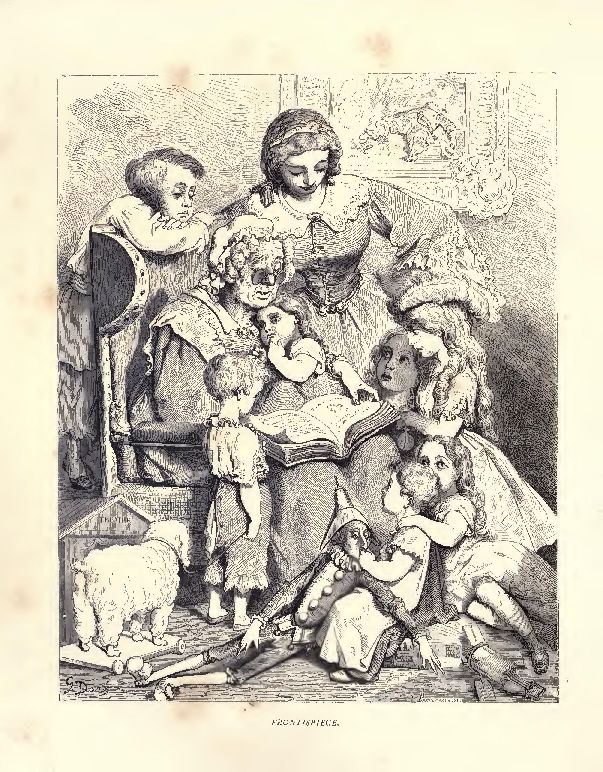

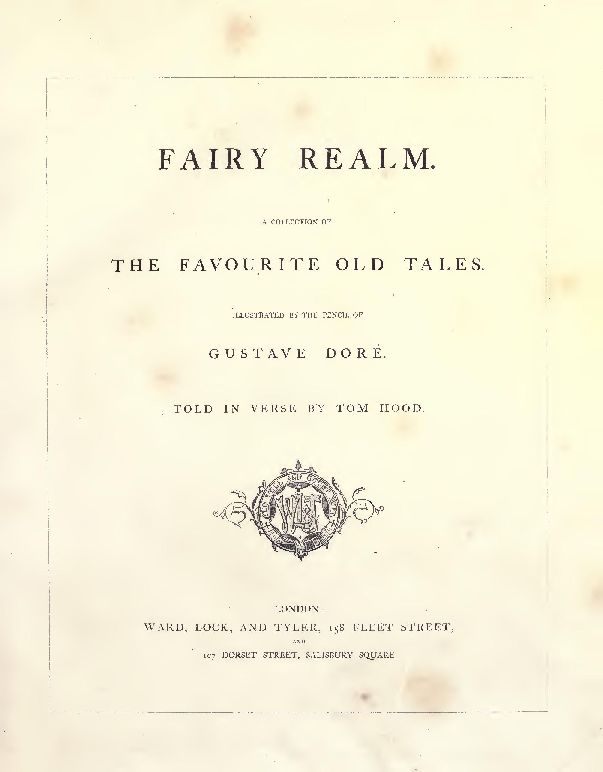
THE five favourite fairy legends which M. Gustave Doré has illustrated are so well known, have been so often told, and in so many different ways, that it was a matter of no small difficulty to determine the best mode of treating them. The plan I have adopted is to give the tales in a simple metre and in the most unpretending manner, going, in short, little if anything beyond mere recital in easy verse. From performing even this plain task as I could have wished I have been prevented by ill health, and I fear that what I have written little deserves the honour of association with works of genius like M. Gustave Dore's pictures. But I have the single satisfaction of knowing that I have done the best I could.
November, 1865.
CONTENTS
IN that strange region, dim and grey,
Which lies so very far away,
Whose chronicles in prose or rhyme
Are dated "Once upon a time,"
There was a land where silence reigned
So deep,—the ear it almost pained
To hear the gnat's shrill clarion blow,—
Though he Sleep's herald is we know.
Scarce would you deem that calm profound,
Unbroken by the ghost of sound,
Had, like a sudden curtain, dropt
Upon a revel, instant stopt,—
That laugh and shout and merry rout
And hunting song had all died out,
Stricken to silence at a touch—
A single touch! It was not much!
I 'll tell you how it came about.
What bevies of pages
Of various ages
Princess Prettipet's christening banquet engages!
They all look as deeply important as sages.
What hundreds of cooks!
To judge by their looks,
They had written the very profoundest of books.
(Of course, books like those by Hobbes, Bacon, or Hooker I
Mean—not mere Kitchener's Essays on Cookery.)
As to the cartes,
From the soups to the tarts,
'T would need to detail them a man of some parts;
While to eat of each item—
To taste—just to bite 'em,
The veracious voracious will own would affright 'em.
If you want to find out
The amount, or about,
Of the salmon, beef, partridges, lobsters, sourcrout,
Maccaroni, potatoes, cream, cutlets, ice, trout,
Lamb, blanc-mange, kippered herring, duck, brocoli sprout,
Sheep's trotters, real turtle, tripe, truffles, swine's snout,
Sole au gratin, snails, birds' nests, Dutch cheese, whiting-pout,
Jelly, plovers' eggs, bitters, liqueurs, ale, wine, stout,
Peas, cheese, fricassées, and ragoût—(say ragout
For the sake of the rhyme)—
And have plenty of time,
And a knowledge of figures (which I call a crime),
Because it's a feat that would puzzle beginners—
Make out and declare
The cube of the square,
Of twice twenty thousand of Lord Mayor's grand dinners.
#####
The invited guests begin to arrive:
With nobles and courtiers the scene is alive.
They hustle,
And bustle,
In rich dresses rustle;
The squeeze for good places is almost a tussle;
Precedence depends not on birth, but on muscle.
But they're none of them able
To reach the high table,
For the grave Major-Domo, perceiving the Babel,
A sufficient space clears
With the King's Musqueteers,
Because he well knows it will cost him his ears
If—when the time comes for the soups and the meats—
The twelve fairy godmothers cannot find seats.
At last there's a bray
Of trumpets, to say
That His Majesty's Majesty's coming this way,
With his Ministers all in their gorgeous array,
And the Lords of his Council, a noble display,
And the Queen, who's as beauteous as blossoms in May,
With her Ladies in Waiting so smiling and gay,
With a great many more
I might briefly run o'er
If at pageants like this I were only au fait.
The glittering procession
Makes stately progression
To the seats that the Musqueteers hold in possession
At the top of the hall;
While the visitors all
Are crowded to death, though the place is not small,
But from wall unto wall
Crammed with short folks and tall,
Who, as chances befall,
And in various degrees
They suffer the squeeze,
bawl, brawl, haul, maul, squall, call, fall, crawl, and sprawl
The King's looking pleasant,
Expecting a present—
Say knives, forks, and spoons that cost many a bezant—
For his daughter and heiress
From each of the fairies;
(A fay for a sponsor in these days quite rare is!)
But fairies, we' know,
Have gifts to bestow
More precious than silver and gold ones—and so
One gives the babe beauty,
Another gives health,
This a strong sense of duty,
That plenty of wealth.
Five, six, seven, eight, nine, ten
Add their presents, but when
Eleven have endowed her, the last of the dozen
Says, "I really don't know what to give her, dear cousin
(Addressing the Queen,)
"But the courses between
I shall hit upon something. I will not be mean;
So pray take your seats, for I'm not such a sinner
As, while I am thinking, to keep you from dinner!"
The King has taken the highest place,
Beside him the Queen in her diamonds and lace.
Each fairy godmother
Sits down by another,
And my lord the Archbishop is just saying grace,
When in comes a cook, with a very white face,
Who cries, as he straight up the hall rushes nimbly,
"Please your Majesty, somebody's fell down the chimbley!
There's silence in the hall
For half a minute,
And not a word doth fall
From those within it;
When, lo!—No!—And yet it is so!
The sound of a foot comes heavy and slow
Up the staircase from down below;
And a figure ill-grown,
Unattended, alone,
Walks straight through the guests to the foot of the throne,
And then with a squeak
Rising into a shriek,
And eyes that with fury are terribly glistening,
Cries, "Pray, sir, why was not I asked to the christening?"
'T was old Fairy Spite,
Whom they did not invite,
Because of her manners, which were not polite.
She led a bad life,
Was addicted to strife,
And besides—worst of all—she ate peas with a knife!
But 'twas really no joke
Her wrath to provoke.
So in hopes to appease her His Majesty spoke,
And said, sore affrighted,
"They both were delighted
To see her that day—
Quite charmed—in fact, they
Couldn't think how it was she had not been invited!
Shrieked Spite, "Silence, gaby!
Let's look at the baby."
The Queen, in a tremble,
Her fears to dissemble,
Said, Here is the darling—papa she'll resemble.
You'd like, p'rhaps, to take her,
But please not to wake her,
She sleeps." "Sleeps!" said Spite, "does she really? I 'll make her
Of sleep, ma'am, have plenty"
(Here—"Chorus "Attente!")*
"If she touches a spindle before she is twenty!
"For if she does, a heavy sleep
Shall over all your palace creep,
And you, with your whole court, shall keep
Buried in leaden fetters deep!"
"Until"—here Fairy Number Twelve,
Who, as we know, was forced to shelve
Her gift because the banquet waited,
Broke in and capped what Spite had stated—
"Until a prince shall come to wake
The Sleeping Beauty, and so break
The spell wherewith old Spite in vain
Would her young life for aye enchain!"
#####
The King sent heralds through the land
Proclaiming spindles contraband,
Pronouncing penalties and pains
'Gainst distaffs, treadles, rocks, and skeins.
And so to spin
Became a sin;
Wheels were bowled out, and looms came in.
No more old women were allowed to meddle
With wheel or treadle;
There were no spinsters left, the fair deceivers
All became weavers;
* The passage I quote in this wild dithyramb you'll
assuredly find in Act I. of "Sonnambula."
The very name and uses of a spindle
To nought did dwindle;
The fashion was, folks said,
Entirely dead,
Expired—past human effort to re-kindle.
Time's wonted pace
Is not a rapid race;
His motto seems to be "Festina lente."
But yet he passed away,
Until at length the day—
Approached on which the Princess would be twenty.
What consultations!
What preparations!
What busy times for people of all stations!
What scouring out of rooms
With mops and brooms!
What scouring to and fro of hurried grooms!
No leisure, not the least,
For man or beast,
Because His Majesty had fixed a feast—
Acres of eatables and seas of ale,
A banquet that should make all others pale,
E'en those of Heliogabalus, deceased—
To celebrate the day his child was quite
Beyond the malice of old Fairy Spite!
It was a scene of bustle and intrusion,
And vast profusion—
Such game, and meat, and fish, and rare confections!
The tables and the chairs
Down- and up-stairs
Were packed away—piled up in all directions,
In chaos, which the master of a house
Whose want of nous
Is such that he allows his wife a soirée,
Discovers round him, when tired out and sorry,
He fain would sleep, but cannot for the din doze—
In short, that plague, "a house turned out of windows."
No wonder the Princess, so meek and quiet,
Should run away from all the dust and riot.
No wonder, I repeat,
When all the suite,
From the Great Seal to her who made the beds,
Were hardly sure if they were on their heads,
Or on their feet!
No wonder the Princess—no soul aware,
Even of those who had her in their care—
Stole from her room, and up a winding stair,
Up to the highest turret's tipmost top,
Without or let or stop,
Went to enjoy the scenery and air!
In a room at the top of the tower that day
Merrily, merrily turned the wheel!
An old dame span, with never a stay,
Merrily, merrily turned the wheel!
The wool was as white as the driven snow,
Merrily, merrily turned the wheel!
And she sang, "Merrily, merrily, oh!
Merrily turn the wheel!"
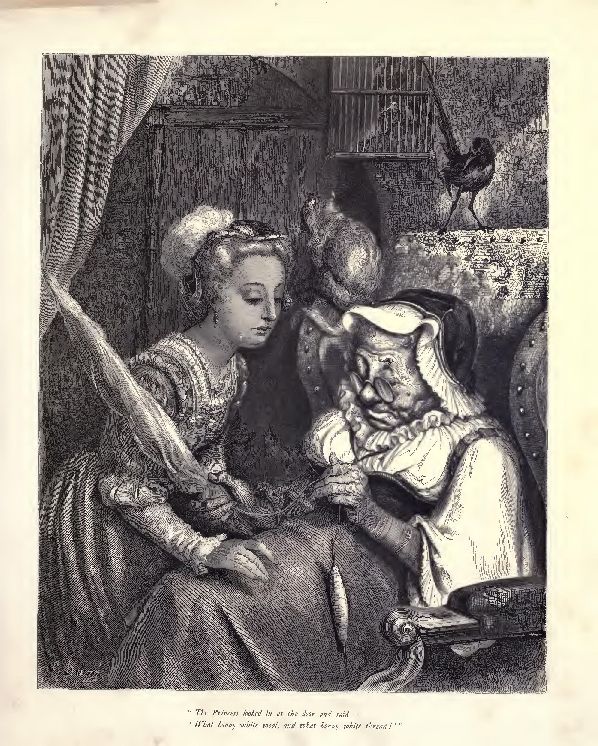
The Princess looked in at the door and said—
Merrily, merrily turned the wheel!—
"What bonny white wool, and what bonny white thread!"
Merrily, merrily turned the wheel!
"Come hither, then, fair one, and make the wheel go!"
Merrily, merrily turned the wheel!
Said ugly old Spite, who sang, "Merrily, oh!
Merrily turn the wheel!"
She turns the wheel and wakes its busy hum,
She twists the white wool with her whiter fingers;
She hears them call her, but she will not come:
Charmed with the toy, in that small room she lingers.
The wheel runs swiftly and the distaff's full,
She takes the spindle—heedless of who calls her.
Two tiny drops of blood fall on the wool,
And all that cruel Spite foretold befalls her!
On one and all
Did sudden slumber fall!
The steed that in the palace courtyard cropt—
The very bird upon the roof that hopt—
The cook who mincemeat for the banquet chopt—?
The gardener who the fruit tree's branches lopt—
The huntsman who his beaded forehead mopt—
The gay young lover who the question popt—
The damsel who thereat her eyelids dropt—
The councillor who fain the state had propt—
The King, his measures anxious to adopt—
The courtier in his new court suit be-fopt—
The toper who his beak in Rhenish sopt—
The scullion wiping up the sauce he slopt—
The chamberlain, as wise as ancient Copt—
The purblind peer who'd in the fountain flopt—
The jester who that fall with mirth had topt—
Stopt!
And over all there came a change;
A silence terrible and strange
Enwrapt the place:
While thickets dense of thorn and brier
Grew round it till the topmost spire
They did efface.
And only agéd crones came nigh
To gather sticks; or, passing by,
Some huntsman bold,
Spying a tower, would ask its tale,
And by the shepherds scared and pale
Would then be told—
How many a prince of noble blood
Had striven to penetrate the wood,
And reach the keep
Where that Princess so passing fair,
With King and Queen and courtiers there,
Lay wrapt in sleep.
But how none ever yet could make
A path through that thick-tangled brake—
And none came back,
But perished miserably there,
And left their bones all bleached and bare
In that dark track!
It was a solemn place, I ween,
Wrapt in its shroud of sombre green,
So hushed and still;
The fall of every leaf you heard,
Nor was there in its shades a bird
To cheep and trill.
No cricket chirped beneath the hedge—
No reed-wren rustled in the sedge—
No skylark soared;
Only at times, where round the keep
Did thickest snaky ivies creep,
A grey owl snored.
The sunlight slumbered on the wall;
The trancéd shadow did not crawl,
Or scarcely crept;
Dreaming the white lake-lilies lay
Above their image, still as they;
The hushed wave slept;
Like hermits dozing in their cells,
Drowsed in the drooping blossom-bells
The murmurous bees;
All languidly the land up-clomb
Around the central palace dome
By slow degrees.
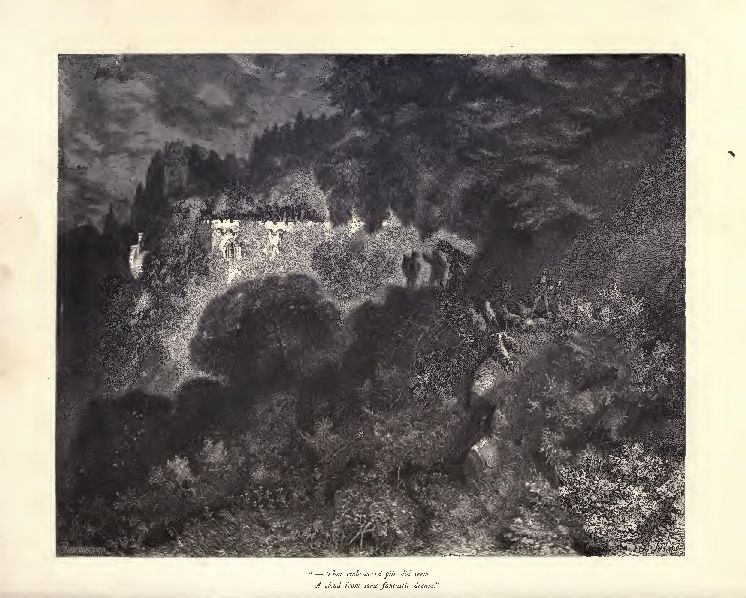
But that embowered pile did seem
A cloud from some fantastic dream—
Some visioned place:
Its towers were clothed in misty sheen,
And slumbering forests seemed to lean
About its base.
The branches nodded, and the breeze
Sighed ceaseless through the sleepy trees,
A long-drawn breath:
Nature's warm pulses here seemed stayed,
Steeped in a trance that all dismayed,
'T was so like death!
Only for ever grew and spread
The sombre branches overhead,
Thick leaf and bloom;
As if to make for Nature's sleep
The brooding silence still more deep—
More deep the gloom!
Into the heart a terror sank:
The vegetation lush and rank
On all sides ran,
And looped and drooped in bine and twine;
And never trace or track or sign
Of living man!
#####
Down by the river that runs through the wood
The horns are gaily winding.
Tra-la-la-la! That music good
Denotes the red deer's finding!
Tra-la-la-la!
La-la! la-la!
The echoes repeat
The music sweet
That tells of the red deer's finding!
Over the river and over the plain,
Through forest, vale, and hollow!
Tra-la-la-la! That note again
Bids all good huntsmen follow.
Tra-la-la-la!
La-la! la-la!
The sweet notes fail
Along the gale,
Then, all good huntsmen, follow!
By many a mile of moorland vast,
By many a mile of forest—
Tra-la-la-la!—the huntsman's blast
Tells where the chase is sorest.
Tra-la-la-la!
La-la! la-la!
Oh, hapless deer,
Thy fate is near,
Which vainly thou deplorest.
In vain the flying quarry seeks
The dark wood's friendly branches:
The chase is done—its race is run,
The dogs are at its haunches.
The Prince looks back. He rides alone,
His suite no longer follow,
And he can hear no friendly cheer
In answer to his holloa!
What a chase!
What a race!
What a terrible pace!
He's outridden his friends. It's a very queer case—
Where can he have got? What's the name of the place
He 'll never be able his steps to retrace!
He pulls up his steed,
Not too early, indeed,
For the poor beast is finished, it shakes like a reed.
If his home lay quite near,
And he knew where to steer,
His horse could not carry him there—that is clear.
Meanwhile each lengthening shadow shows
That day is drawing to a close.
In two more hours the glowing sun
Will down the western heavens run,
And quench its glories manifold
In yon bright sea of molten gold.
Before him that dense thicket vast and dim
Spreads out its awful silence and seclusion,
And none is near to tell its tale to him
And scare intrusion.
On either side his path a giant bole
Rears its huge form, a rude gigantic column.
That gloomy portal does not fill his soul
With fancies solemn.
His step is light on the luxuriant sod,
From the green blades a thousand dew-drops spurning.
Little he dreams that path has ne'er been trod
By foot returning.
Heedless he views the dark nooks in the glades,
Passing to spots that shafts of sunlight brighten—
Nor knows that human bones within those shades
Are laid to whiten.
For him there is no terror in the spot,
No hint of deaths to which it interest sad owes;
For him no spectres its bright sunshine blot,
Or fill its shadows.
For him the secret of that grove profound
Is locked away—that tragic tale, and tearful.
To him the death-like calm that reigns around
Is strange, not fearful.
So on he fares, through sunshine and through shade,
By paths that ne'er before were trod by mortal,
To where the dusky forest's green arcade
Leads to a portal.
Along that silent avenue the young Prince gaily passes,
'T is carpeted with velvet moss beneath the nodding grasses.
The dreamy sunlight through the boughs upon the green sward streaming,
Sets here and there with radiance rare a lingering dew-drop gleaming.
On either hand rise lofty stems; above, the branches mingle;
And, as a glimpse of blue shuts in the end of some green dingle,
Framed in an arch of greenery where that long alley closes
He sees a flight of steps, a gate o'ergrown with truant roses,
And some one who beside the gate in that warm sunshine dozes.
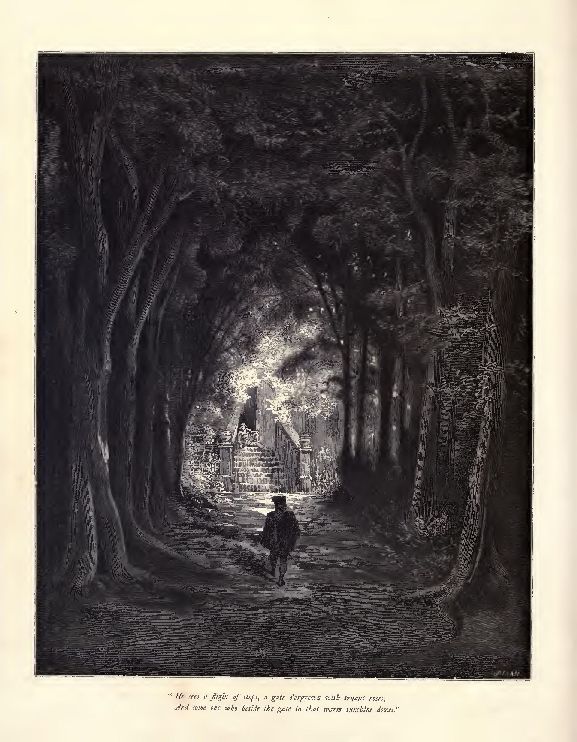
Was ever there found
A sleeper so sound?
He thumps him and shakes him,
But that never wakes him;
Not kick, tweak, or pinch
Can stir him an inch.
I don't think he'd stir if you gave him a—pig—
An immoderate slice of the coldest "cold pig."
Cried the Prince, leaping o'er
The page, "Qu'il s'endort!"
So he left that inveterate sleeper to snore
While he ventured on farther the place to explore.
"'T is a very fine place
As one clearly may trace—
Though, by Jove," said the Prince, and he made a wry face,
"From the dirt that's about, it don't seem they can muster
So much as a Turk's head, or dust-brush, or duster!
It's quite an inch thick:
Oh, wouldn't I lick
The minions for playing this slovenly trick,
If I were the owner, and had a big stick!
Look! with curtains of velvet and carpets of plush, rooms—
And yet the floor's covered with toadstools and mushrooms!
It's well for the parlour-maid she'd not beside her
This child, when she left that great cobweb and spider.
It's evident cleanliness isn't their hobby!"
With these words the Prince reached the end of the lobby.
From the lobby he passed to the guard-room, and thence
To the courtyard and gardens, which both were immense.
The palace, he sees,
Lies back beyond these,
Apparently rather too darkened by trees—
They're not trees though he finds, bringing closer his peepers,
But ivy and woodbine and other quick creepers,
Which with no interference of gardeners to "worret,"
Have climbed to the roof of the loftiest turret.
How those creepers have turned and twirled,
Twisted, wandered, rambled, and curled!
Such a place, I ween,
Had never been seen—
From basement to roof in such greenery furled—
Throughout the whole inhabited world.
Not even that building, so widely known
For its want of proportion—
That vast abortion,
The Exhibition of 'Sixty-two,
Though quite a monstrosity to the view,
Seemed half so "overgrown."
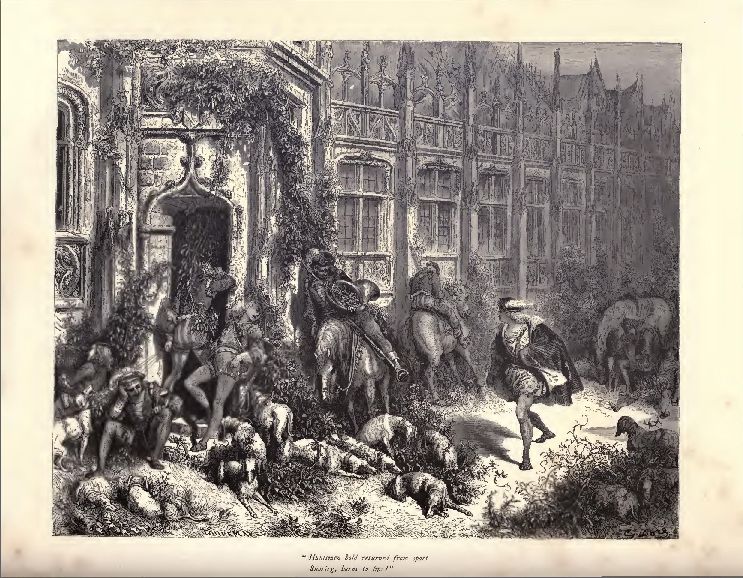
Swift across the court
Now the young Prince trips,
Sees around a sallyport
Hounds asleep in slips;
Huntsmen bold, returned from sport,
All prepared to blow a mort,
Snoring, horns to lips!
There they were becalmed, like ships
Lying with all sail outspread,
Lifeless on an ocean dead.
He draws near: there is no one to bar his way,
E'en the steeds are too sleepy to utter a "nay,"
While each single hound
In the pack, I 'll be bound,
Is so sound there's no chance of his making a sound,
Though not wanting in bark, since he's closely bound round
With branches of creepers;—but then they are boughs
That are not of the sort to be followed by "wows."
One huntsman would have an ugly fall
If he were not upheld by the palace wall,
Whence a stray branch of woodbine, in pitying scorn for him,
Has thrown out a trailer that's winding his horn for him.
Another one, dropt
Off soundly, is propt
By a buttress that stands where his steed by chance stopt.
An odd pillow, I vow;
For you 'll surely allow
That unless of some slumber your need is the utt'rest,
A sleep on a buttress seems anything but rest.
Two men in the doorway
Appear in a poor way,
So closely they're bound
And wound
Around;
Their feet in fetters, their temples crowned
By the snake-like stems in their various inclinings,
That they must appear
To the Prince, I fear,
Sleeping partners in some branch department of Twining's.
Past grooms as unawakened as sad sinners,
Past screws of hunters sound as Derby winners,
Past hounds as fast—no less—
As the express,
Through Bedfordshire into the land of Nod,
The young Prince trod,
And on through corridors and long arcades,
Halls wrapt in sombre shades,
And anterooms wherein had Echo slept
So long, it scarce awakened as he stept
Lightly and swiftly o'er
The dusty floor,
That sadly stood in need of being swept.
And ever and anon,
As he passed on,
In room, in hall, on stair,
Here, there, and everywhere,
He came on sleepers sleeping with the air
Of folks at active work by sleep o'ertaken,
Whom nothing could awaken;
Not even being—like physic with a sediment
That to its being swallowed's an impediment—
Well shaken!
The housemaid, seemingly in fuss and fluster,
Tripping downstairs with feather-broom and duster,
Caught unaware
Upon the bottom stair
By sudden slumber, had quite failed to muster
Sufficient sense to rouse herself to any stir,
And so lay dozing up against the banister.
A lacquey, carrying upstairs the coal-scuttle,
Had fallen napping, and let fall the whole scuttle;
A giddy page
Was, with another youngster of his age,
Playing at fly-the-garter in, the hall
When both asleep did fall—
One
Going to take a run,
Straining to start (as when is trained a pup—any
Pointer or sporting dog—and there gets up any
Partridge or pheasant, in the slip he 'll strain),
The other of the twain
Had fallen asleep while tucking in his twopenny!
Within their barracks several of the guards
Were quarrelling in their slumber over cards;
The butler in the cellar at the tap
Was taking such a nap,
He'd filled his silver flagon o'er and o'er,
And let the wine run all about the floor
Until the cask was drained and held no more.
But he'd continued after that to snore,
Until he was as dusted
And cobwebbed and encrusted
As rare old port, bottled in 'Thirty-four.
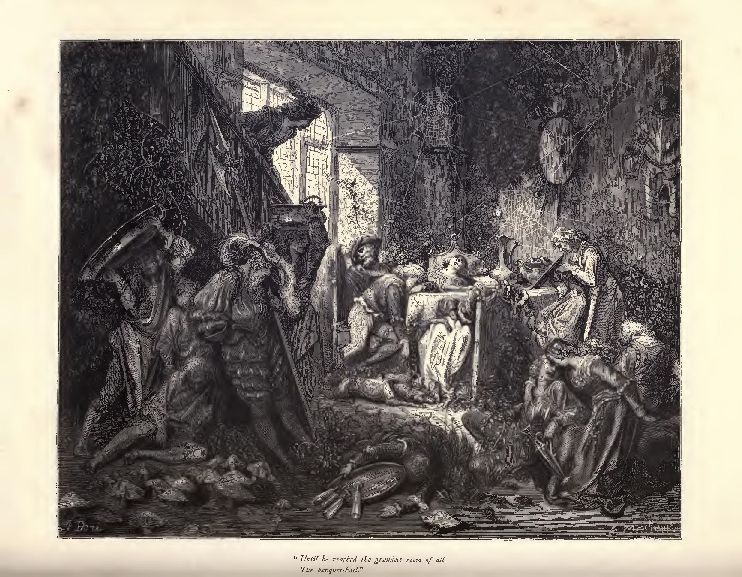
All these the Prince passed by with stealthy tread
As on he sped,
Until he reached the grandest room of all,
The banquet-hall,
Where on the board a mighty feast was spread.
But since the day when first that cloth was laid
Time had strange havoc made
With dish and dainty on the board arrayed;
Had played strange tricks
With those—some five or six—
People of station
Who had been favoured with an invitation
To dinner with the ruler of the nation;
In short, to no conclusion harsh to jump, any
Person of taste
Had thought the King disgraced,
Not only by his room, but by his company.
Vast mushrooms, spawn of hideous dreams,
Had quickened in the rotting seams,
And dusty cobwebs huge,
Wherein did bloated spiders lie,
And feign to sleep, were hung on high;
But there was neither gnat nor fly
To catch by subterfuge.
The very mice had fallen asleep
That ventured in that hall to creep.
And where the sun athwart the gloom
Poured through the pane
A glittering lane
Like Dreamland's golden bridge,
You looked for stir of life in vain,
Because the very midge
Slept in that drowsy room,
As silent as the tomb!
The King—with half-way to his lips the beaker,
And head half turning to the latest speaker—
Presiding o'er his banquet, slumbered there-amid.
Like the first Pharaoh sleeping in his pyramid;
While the Prime Minister, acute and wise,
Still saw what must be done with fast-shut eyes,
And, as behoved him in the royal presence,
Kept nodding to his Sovereign acquiescence.
The Treasurer and Chancellor of Exchequer
Was bolt upright, as trim as a three-decker.
For raising coin and borrowing he was meant,
And nobody could ever say he leant
To right or left,
E'en when of sense bereft.
The Secretary, Foreign and Domestic,
Upright did less stick,
And, being long accustomed to indite,
Inclined to right.
Beside the door a sentry
Stood like the Roman soldier in the entry
Discovered in the ruins of Pompeii,
(Or Herculaneum—which was't? You see, I
Have got no book of reference at all
Here in the country, not e'en what we'll call,
For sake of rhyme, a classical invént'ry.
At any rate, he stood
There like a thing of wood;
And by his side did stand,
Salver in hand,
A servitor whose duty was to cater
With flagons, flasks, and bowls
For all the thirsty souls—
(He's called a buttery-man at Alma Mater)—
Well! There this lad of liquor
Remained a sticker
Against the stair-foot, with his laden tray
Of claret, sherry, Burgundy, Tokay,
And other wines we 'll call et cætera—
Just like a very image or dumb-waiter.
Another 'mid the goblets lay a-sprawl—
It made the young Prince think
Him overcome with drink,
Which really had not been the case 'at all.
O ercome he was there's no denying, but
'T was only sleep; for though the glass was cut,
He was not even blown—
He could have shown
He did not owe to any drop his fall.
Through every tiny crevice, nook, and cranny,
Heaven knows how many
Of every kind of creeping plant had sprouted
And grown and wandered since,
Till the young Prince
If he were in—or out—of doors half doubted.
The clinging tendrils,
Which Nature (as an officer his men drills)
Had taught to turn one way, enwound and bound
The silent sleepers who all slept so sound.
One trailer formed a sort of chain between
The foremost Maid of Honour and the Queen,
As if to say
To those who sleeping lay,
"It's time to rise, good sirs, and go away"—
In short, the very same remark that made is
By stingy hosts who save their wines by dint
Of the discourteous hint,
"Come, don't you think it's time to join the ladies?"
The young Prince gazed
Upon the scene amazed.
He shouted; not a single head was raised—
No single sound upon the silence broke—
Nobody spoke—
All heads alike were bowed.
He shouted loud
As one who wishes to outroar a crowd;
But not a word
He heard—
No creature stirred:
The situation really seemed absurd.
There lay the feast
Untouched for years at least;
And though they'd sat so long,
Not one of all the throng—
Of feeding seemed inclined to be beginner,
And there was the young Prince,
Dropt in some minutes since,
And making such a din
Since he'd come in,
That he became for them another dinner.
At last tired out,
Of vain attempts by shout,
And even shake, to rout
From their deep sleep the slumberers about
The banquet-table,—
Whether he'd be able
Ever to wake them, feeling quite in doubt,
The Prince made up his mind
To leave them all behind,
And see if some one waking he could find,
And so passed on through halls and quiet cloisters,
But everywhere found people mute as oysters
And sound as tops.
But yet he never stops,
Though neither man nor woman, girl nor boy stirs.
All is as still as death,
And not a breath
Stirs the ancestral banners or the arras;
No page's voice or groom's
Heard in the rooms,
No maid's shrill tongue the listener's ear to harass;
No step upon the stair,
No footfall anywhere,
Not e'en on what Jane Housemaid calls the tarrace.
But still the Prince his onward course pursued,
Half fearing to intrude,
As each fresh chamber doubtfully he stept in.
In tiring-rooms he views
The ladies' maids so tired they 're in a snooze.
Then for a change
Through sleeping-rooms he 'll range,
Which by some contradiction very strange
Appear the only rooms that are not slept in.
Yet onward still he strays
All undecided,
And yet his steps are guided;
For round his head on airy pinion plays
A band of Fays,
Who lead him forward still by devious ways,
To where the Sleeping Beauty lies,
O'er whose tender violet eyes
For such years the lids have closed,
On her couch while she reposed.
"Come away!" sang each Fay,
"Now we hail the happy day
When the Prince shall break the spell
Spoken by old Spite the fell.
Now sing we merrily,
For the destined one is he!"
Thus all gladly sung the Fays,
Though he could not hear their lays,
Wandering on as in a maze.
Last he reached a silent chamber,
Where through all the woodbine's clamber,
And the roses' red profusion,
And the jasmine's silver stars,
Glowed the glorious sun's intrusion—
Misty golden bars,
Touching all with amber.
But—or e'er that room he entered
Where the magic all was centred,
For a space, in wonder, dumbly
Gazed he on that figure comely
Sleeping in the snowy bed,
Where the sunshine splendour shed
From the casement's pictured pane
Crimson, blue, and yellow stain
In a variegated rain.
(Not all colours, as we know,
That in painted windows glow
Can the sun contrive to throw—
Primal tints, red, yellow, indigo,
Will, however, through a "windy" go.)
One moment on the threshold—
One moment and no more!
So like a thing of dreams
And Fairyland she seems,
That he must pause till time his breath restore,
And he of life take fresh hold—
One moment and no more—
And then across the room he bounded
To that white bed by clustering bloom surrounded—
Across the startled floor,
Whence foot had been estranged so long before,
The frightened echoes that his step awoke
Seemed shrieking out to hear when silence broke!
In her bed, as white as snow,
Softly had she slumbered,
While old Time with silent flow
Had the long years numbered.
Quiet as the dead she lay,
Sleeping all those years away
On her pillow, woodbine-cumbered,
Wreathed with flowering may.
And her breath so softly slips
Through the rosy-tinted lips,
That the white lace seems to rest
Moveless on her whiter breast—
That it scarce appears to stir
One of all the fluttering motes
That, in love to look at her,
Glitter down the golden lanes
That the sun pours through the panes,
Bright with armour-coats.
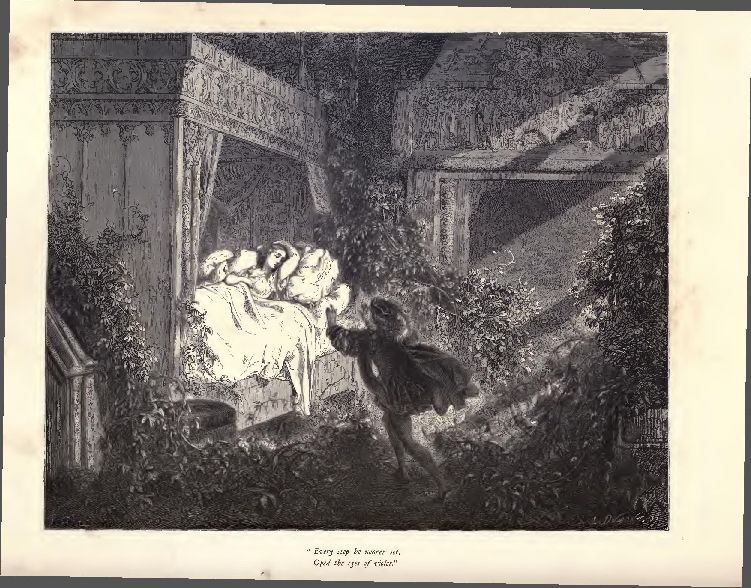
Drawn by her sweet lips' perfume,
As a bee to golden broom,
When the braes are all in bloom,
Stole the Prince across the room.
Every step he nearer set,
Oped the eyes of violet—
Oped a little—wider yet!—
Till the white lids, quite asunder,
Showed the beauties hidden under—
Showed the soft eyes, full of wonder,
Opening, towards him turned—
Till their radiance bent upon him
From his trance of marvel won him;
And his bosom burned
With the passion to outpour
All his soul her feet before,
Careless if she spurned,
So that he might only tell
That he loved her—and how well!
Now through the palace woke the stir of life;
Both fork and knife
Were in the banquet-hall with vigour plied,
While far and wide
Awoke so great a riot after the quiet,
It seemed as if the household was at strife.
Girl, woman, boy, and man
Bustled about and ran—
All hurried, not one plodding!
Because, you see,
Each thought that he or she
Had been the only one that had been nodding,
And, fearful of detection,
Was bound to strive and look alive,
In order to escape correction.
Meanwhile the red sun set. And yet
The household did not into order get:
All was surprise and wonder,
Error and blunder.
The fire was out, the cook was in a pet,
The feast was cold, the Queen was in a fret;
The hunters just returned, they thought, from hunting,
Felt it affronting
Their game should get so very high and mite-y;
The housemaid, seeing all the dust and dirt,
Felt hurt,
It drove her almost crazy—at least flighty.
But over all this din and turmoil soon
Uprose the silver moon,
And by its rays shed on the dewy grass,
Forth from the palace that young pair did pass,
And threaded the deep shades
In the arcades
Of sombre forests that around them lay.
And so they took their way
To Fairyland, wherein, as legends say,
'Mid mirth and merry-making, song and laughter,
They married, living happy ever after—
And there, I'm told, they 're living to this day!
BY the side of a wood
A cottage once stood,
Where a little girl dwelt, who wore a red hood.
Her father of trees in the forest was cutter,
And her mother sold poultry, milk, eggs, cream, and butter.
The little red hood,
It must be understood,
Belonged to a mantle—as pretty and proper a cloak
As e'er you set eyes on:—in short, a red opera cloak.
But operas ne'er, that I am aware,
Had been heard of by any one dwelling round there;
Whereas every dame had a cloak bright as flame
That she wore when out riding (which gave it its name.)
For then in those parts
They'd no chaises, spring-carts,
Gigs, or waggonettes, such as a farmer now starts;
So Hodge, Reuben, or Giles,
Went his eight or ten miles
By the road—or the bridle path, dodging the stiles—
On his nag, grey or brown, to the next market town.
And were you to meet him, I'd bet you a crown
You would certainly find him
(If your sight's not, like mine, dim,)
A-jogging along with the goodwife behind him,
Perched up on the pillion of Dobbin or Dapple,
With a cloak like a poppy and cheeks like an apple:—
A cloak with a hood, that was really some good,
For use, not for ornament—one that you could
(That is, if you would)
Draw over your face quite closely, in case
The sun was too warm or the rain fell apace,—
A both-ears-protecting, eyes-shading, hair-hiding hood.
And that's why they called the child Little Red Riding Hood.
By the side of the cot where Red Riding Hood dwelt
Was a garden, surrounded by trees;
The flowers were the sweetest that ever were smelt,
And were greatly beloved by the bees,
Who led jolly lives
In a couple of hives
Well sheltered from shower and from breeze.
Beyond the small garden, whose flowers were so sweet
Bees wooed them through long summer days,
The woodman had cleared a small patch for the wheat
That, as each year came round, he would raise,
To grind and to bake
For bread and for cake——
Simple wheat, not that wonder, a maize!
Now the sun rises and the world awakes,
For morning—like a careless servant—breaks;
And from house, hut, and cot,
Hind, farmer, or what not,
Each villager his way to labour takes.
Each stride he makes a thousand dew-drops shakes
From off the fresh green grass they were besprinkling,
And makes them wink,
And gleam, and glance, and blink,
Until the peasant in great haste you think
Because he walks the whole way in a twinkling.
Red Riding Hood's father has shouldered his axe,
And is off to the woods again.
At the thwacks and the cracks as the timber he hacks
The echoing shades complain;
But woe to the stem that his steel attacks,
For its murmurs are all in vain.
Red Riding Hood's mother has risen with day,
As soon as the hens were awake,
And down to the kitchen has taken her way,
From the hearth all the embers to rake,
And the butter and flour on the table to lay,
For she's bent upon making a cake.
But little Red Riding Hood's slumbering yet—
She is terribly lazy, I fear;
For little folks up in the morning should get
As soon as the light becomes clear,
And not sleep away
The best time of the day,
Which is six, or about:—as I hear.
When the cake's nice and brown
The young lady comes down,
In her little white apron and little blue gown;
Has for breakfast a bowl of fresh milk from the cow,
And when she has finished, her mother says, "Now,
Just slip on your cloak, dear, as quick as you can; I
Want you to carry some things to your granny!"
Red Riding Hood's drest,
And, looking her best,
Is only awaiting her mother's behest.
On the table is laid
The cake that was made
Ere Red Riding Hood opened her eyes, I'm afraid,
And beside it a pot
Whose equal could not
At Fortnum and Mason's be easily got;
For, as every one tells me, fine fragrant fresh honey
Is not always obtainable, even for money.
There are very few treats in the matter of sweets,
Like the honey one fresh from the honeycomb eats.
But fond as I am of a little fresh honey,
I can't watch the bees in their wanderings sunny
Without a great risk of a painful disaster,
Though I think it would trouble the famous "Beemaster"
(As his real name's a secret, we 'll say Dr. Thingamy)
To explain to a "fellah,"
Qui tam amat viella,
How it is that the bees make an object to sting o' me.)
"Little Red Riding Hood, child of mine,".
Said the mother to her daughter,
"Through the forest of beeches, and larches, and pine,
And down by the pool of water,
And over the fields to your grandmother's cot
With the griddle-cake and the honey-pot,
Go, and tell her what you have brought her.
But—mind what I say—do not delay
To chatter with folks or pick flowers on the way!"
Little Red Riding Hood promised her mother
She'd not stop on the road to do one or the other.
"Such allurements I old enough now to withstand am,
So I 'll carry the honey and cake to my grandam,
And then you shall see how quick I can be.
Good bye, dearest mother!" And off hurried she.
The fields with buttercups are gold,
The hedges white with may;
The woodbine's trumpets manifold
Are bright beside the way;
The foxglove rears its lofty spire
Where hang the purple bells;
In shady quiet nooks retire
The modest pimpernels;
The poppy the green corn-fields decks,
The meads are bright with cowslips.
She loiters on her way, nor recks
How rapidly time now slips.
She enters now a glade,
Dappled with light and shade,
Through which the path is to her grandam's made;
And as she strolls along,
Singing her careless song,
She meets a grim grey wolf. She's not afraid,
Because close by
She hears her father ply
His axe, and knows he'd to the rescue fly
If Master Wolf should any treason try.
And Master Wolf knows too it would not do,
Although it's hard with such a meal in view;
And so most laudably
He makes himself quite pleasant,
For the present,
Albeit his stomach's crying "cupboard" audibly.
"What a nice cloak of scarlet!
How pretty you are! Let
Me carry that cake or that very big jar:—let
Me carry it, pray—are you taking it far? Let
Me see you safe there!" said the wicked old varlet.
Alas! for Little Red Riding Hood,
That she should be naughty instead of good;
That she should let the old wolf flatter,
And allow him to walk
By her side and talk,
When her mother so strictly forbade her to chatter.
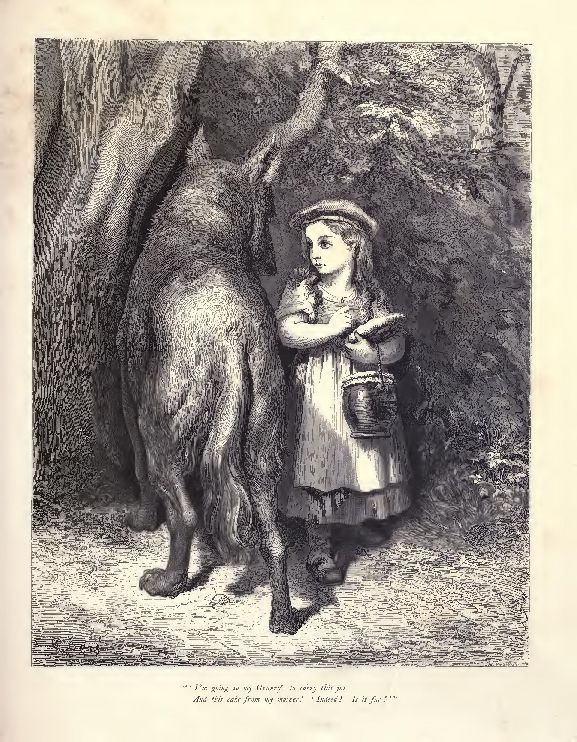
"What your name is, my dear," he said, "fain I'd be knowing."
"I'm Little Red Riding Hood." "Where are you going?"
"I am going to my granny's, to carry this jar
And this cake from my mother." "Indeed! Is it far?"
"Oh, you go through the wood, and a little beyond
You 'll see a small cottage that stands by a pond."
"And your granny lives there?" "Yes; but now she's so old
She can't get out of bed and she suffers from cold."
"Poor dear," said the wolf, with a pitying grin;
"But how does she do about letting you in?"
"When I reach granny's cottage I always take care
To knock at the door till she calls out 'Who's there?'
]Your grandchild, who brings you a bite and a sup
From her mother,' say I;
And she's sure to reply,
'If you pull at the bobbin the latch will fly up.'
That's how I get in." "Oh!" said wolf, in a hurry,
"This lane is my way,
So I 'll wish you good day."
And he vanished at once in a terrible scurry;
Said Red Riding Hood, "Doesn't he seem in a flurry!"
Like a shot from a rifle,—or faster a trifle,
Away goes the wolf, and, I 'll wager my life, 'll
Be up to some mischief or other ere long,
For his only delight is in doing what's wrong.
Off through the wood—(he's up to no good),
Hastening still—(bent upon ill),
Round by the pond, to the cottage beyond
(He's after some evil I 'll give you my bond),
Stealing along—(intending a wrong)
Towards the grandam's abode, by the skirts of the road,
(By skirts I don't mean either muslin or calico,)
He sneaks to what Shakespeare has called "miching mallecho."
Rap, tap! at the door.
In the midst of a snore
The old lady woke up with a start, and said, "Lor!
Red Riding Hood ne'er knocked so loudly before.
Oh, deary me, it cannot be she;
I 'll pretend I 'm still sleeping, and then we shall see."
Rap, tap! once more
She heard at the door:
The wolf rapped so hard that his knuckles were sore.
"The old woman sleeps like a top—what a bore!
If she doesn't make haste,
My time I shall waste—
I shall miss that tit-bit who's so much to my taste."
Rap, tap! Tap, rap!
"She must wake from her nap,
Or the child will be here
Before I can clear
Her foolish old grandmother up, every scrap."
At last said the grandam,
"I rather a hand am
At sleeping, I know,
Very soundly, and so
Perhaps she has waited and knocked there so long
That, in order to wake me, her tap becomes strong.
Who 's there?" then she cried;
Said the wolf from outside,
Disguising his voice the deception to hide,
And whispering low with his mouth to a cranny,
"It's no one but Little Red Riding Hood, granny!
I've brought you some butter, some eggs, and a cake
That mother got up in the morning to make,
And she sends you besides some nice cream in a cup"
"If you pull at the bobbin the latch will fly up!"
Wolf pulled at the bobbin,
And—what a sad job!—in
He went; but no sooner had thrust his grim knob in
(But for rhyming, instead
Of "knob" I'd say "head")
Than the frightened old lady sat bolt up in bed:
But before she had time to exclaim, "Oh my gracious!"
She was bolted entire by the monster voracious;
Who, though the fierce pangs of his hunger were gratified,
Remarked to himself, with a grumble dissatisfied,
Tough skinny old folks are not nice things to victual one;
However, no matter! Here goes for the little one!"
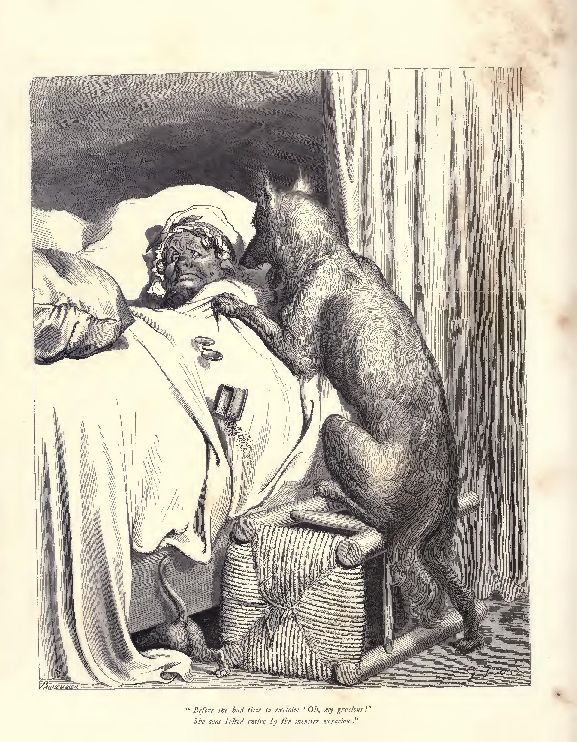
Then he turned down the bed-clothes and quickly jumped in,
And granny's big nightcap tied under his chin:
And he cuddled the clothes
Close up to his nose,
And was speedily off in a very nice doze;
For said he, "For Red Riding Hood if I'd have any
Respectable twist I must first digest granny.
For though at one meal I could eat child, pa, and mamma,
There's a good deal of picking somehow about grandmamma!"
Little Red Riding Hood loitered along,
Stopping to hear while the thrush sang his song,
Or to list in the croft to the blackbird's clear whistle,
Or to follow the feathery down of the thistle—
Or blowing in flocks
The seeds from the "clocks"
Of the bright dandelions, or searching the docks
For the burrs, whose chief trick
Is to catch and to stick
To one's garments, no matter if thin ones or thick:
(Though it matters to you,
Because they come through—
Supposing your clothes are the former—and prick.
Why, foolish butterfly,
Will you skip, flutter, fly
Close by the child? You 're an idiot utter, fly!
She puts down the honey and cake in a trice,
And the latter's immediately stolen by the mice.
But what does the latter at all to her matter:
She's after that butterfly, mad as a hatter.
[It's not clear to me
Why a hatter should be
Proverbially called a fit subject for De
Luncitico—so runs the writ—inquirendo;
But I fancy the hatter this harsh innuendo
Must, in the first place, to a humorous friend owe,
Who fain in the sneer would his gratitude smother
For a man who's invariably felt for another.]
Through pastures and meads as the butterfly leads,
Red Riding Hood follows, and little she heeds
The orders and warning her mother that morning
Had given her, or even her grandmother's needs.
But when she comes back once again to the track,
And finds the cake gone, she grows frightened. "Alack!"
She cries, "what a loss!
Won't granny be cross,
To breakfast off nothing—with honey for sauce?"
Just then a glittering dragon-fly
On gauzy pinion darted by.
Oh, he was clad in burnished mail,
His wing a fairy galley's sail,
And he was twice as big, I ween,
As the biggest butterfly she had seen.
Soon forgotten the honey's;
She off with a run is
Where the dragon-fly glancing so bright in the sun is.
By ditches and hedges, by rushes and sedges,
By ponds full of reeds and all sorts of weeds,
By pools that are stagnant, and brooks full of waterbreaks,
She chases Libellula
Eagerly. [Well, you'll a-
Llow there must some
Awful punishment come
When her mother's commands in this manner a daughter,
But conceive her concern
When, on her return,
She finds that an empty jar's all she can earn.
For the ants had discovered it placed in a sunny spot,
And cleared all the honey, and left but the honey's pot.
Said she, "Lack-a-day!
What will grandmother say?
And shan't I get scolded for stopping to play!
I'd better get on without further delay!"
Resolution how vain! Again and again
She loiters in meadow, wood, highway, and lane—
Strays into the coppice
To pick the bright poppies,
Or climbs up the hedge for the nest that a-top is;
Or else she emerges
Where widely diverges
The forest's long avenues—leafy green arches
Of beeches, of ashes, of elms and of larches,
Which she lingers beneath
To pick for a wreath
A bright trail of ivy, that some lofty stem on is,
Or with bluebells her apron to fill—or anemones;
Or to watch the quaint habits
And ways of the rabbits,
And the plans of the crows,
Who, as every one knows,
Establish their scouts
At certain look-outs,
To warn them of danger whenever they 've doubts.
[As touching these rooks,
Natural History books
Declare that the thing to their greatest éclat's
The fact—which should win them the warmest applause—
That nothing they do is e'er done without caws.]
But now she has passed
Through the forest, and fast
Is approaching her grandmother's cottage at last.
What excuse can she make
For the honey and cake?
At the thought of that scrape she's beginning to quake.
She creeps through the garden,
Attempting to harden
Her heart, and declare she "Don't care a brass farden."
But, in spite of her trying,
She's very near crying,
And asking her granny to grant her a pardon.
The knock is so faint, that the wolf's scarce aware
That there's any one knocking, but cries out, "Who's there
"Red Riding Hood"—here on her speech broke a sob in—
"Come to see you." Said wolf, "If you pull at the bobbin,
The latch will fly up!" So she opened the door,
And tottered with terrified feet o'er the floor.
Said wolf, "Where's the cake
Mother promised to make?"
"Please, granny, to-day she's not able to bake,
For love or for money."
"Then where is my honey?"
"What makes you expect any, granny? How funny!"
Said Little Red Riding Hood, trying to smile,
Although in a terrible fright all the while.
"To send me no breakfast," said wolf, "she was silly;
I 'm feeling so hungry and faint, I'm quite chilly.
As you 've brought me no food, you must warm me instead;
I 'll take you in place of my breakfast in bed.
So take off your things, and, some help to your gran to be,
Jump into bed, just for once warming-pan to be."
She takes off her clothes,
And into bed goes.
Old wolf keeps the counterpane up to his nose,
But the child sees with fear
That, now she's so near,
Her grandmother's looking remarkably queer.
She trembles with fright, and in sad perturbation,
Commences the following brief conversation:
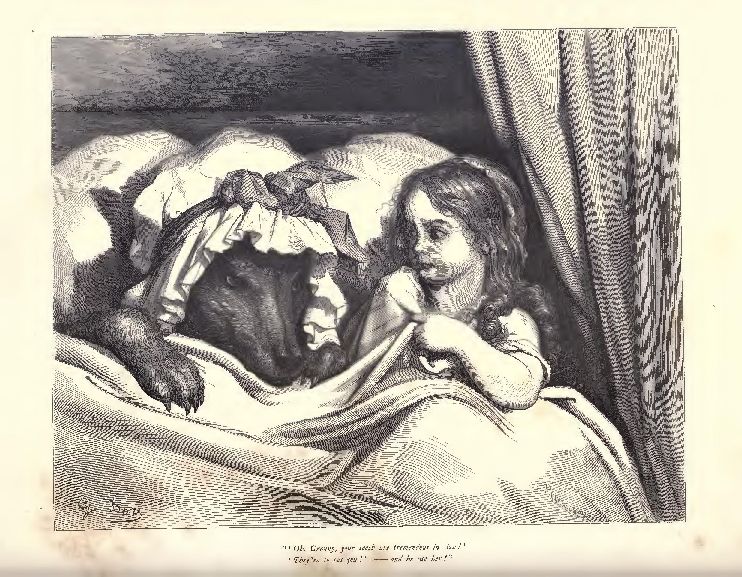
"Oh, granny, I view your long ears with surprise!"
"They 're to hear all you say to the letter."
"Oh, granny, how fiery and big are your eyes!"
"They 're to see you all the better."
"Oh, granny, your teeth are tremendous in size!"
"They 're to eat you!"
—AND HE ATE HER.
'THERE once was a miller, who lived till he died—
It's been done by a good many people beside;
But this miller, you see,
In particular—he,
On the brink of the grave—"on the banks of the dee,"
As a Scotchman would say (vide song "Annie Laurie;"
It North-country short is
For articula mortis)—
Made a will, whence arises the whole of my story.
Three sons had this miller,
To whom all his "siller," *
Stock, business, premises, goodwill, and "wilier"—
A tenure, in short, not to spin out my verse, on all
Things he died "seised" of, both real and personal,
(Exclusive, of course, of the very bad cough
With which he was seized—and which carried him off)
He had to devise—
And, as you would surmise,
Would divide in accordance with ages and size.
But no!—not a bit!
He hadn't the wit
For such a division—or didn't see fit;
* Though with terms Caledonian this story is filled,
You 'll find it, I hope, only scotched, and not killed.
But made a partition
So strange in condition
That to one 't was a blow—for the others a hit.
It is half after one,
The funeral 's done,
The reading should now of the will be begun.
The youngest is crying,
The others are trying
To think who's most colour for praising the dying;
Their loss doesn't grieve,
Since it does not bereave
Them of all that their father was able to leave.
(Though "where there s a will," says the proverb, you know,
There's always a Way"—there's not always a Woe.)
When the will is recited
They both are delighted,
For it proves their young brother is cruelly slighted.
For joy they with decency scarce can bemean them
When they find that their dad
Every thing that he had
Has left them, the eldest, to own all between them,
Save one thing—and that
Is only the cat,
Which he leaves to the youngest, described as "that brat."
The youngest, poor lad! didn't care what he had,
By the loss of a father, not fortune, made sad.
But as silent he sat, nursing his cat,
And quite at a loss what he next should be at,
Each brother, addressing him sternly as Nemesis,
(Who, the Greeks say, less just and more cruel than Themis is,)
Said, "Now then, young Lazybones! Clear off the premises!''
He asked for some bread and some straw for a bed,
And he'd work like a slave for his brothers, he said.
But they both answered, "No! you'd much better go:
We shall have to assist you along if you're slow!"
So, half broken-hearted, the poor lad departed,
And thus in the world for himself he was started.
'T was a poorish look out,
Of that there's no doubt;
He'd not an idea what he'd best set about.
So, much to be pitied,
The old mill he quitted.
The door gave a slam—
Not one pang was spared for him—
He sat by the dam,
And that nobody cared for him
He could not help feeling—and what was prepared for him!
Thus he sat, while big tear-drops his eyes were suffusing,
Nor speaking a word,
Till he suddenly heard,
As he was a-musing, his cat, too, a mew sing.
"Ah, Puss," he said, "you
Are unfortunate too;
I'm inclined to think yours the more serious disaster
In having a penniless wretch for a master."
Puss, thus addressed, his master caressed,
And then in plain language his feelings expressed.
"Dear master," said he, "just leave it to me;
You shall see, then, I promise, what then you shall see.
I 'll at once undertake
Your fortune to make,
And assist you to wreak your revenge on those brutes;
And all that I want is a new pair of boots!"
The notion was funny:
He hadn't much money,
But as nothing more hopeful appeared to be done, he
Went off to a cobbler, who lived in a stall,
And ordered the boots to be made—rather small.
New boots, too! Not shabby, old, worn-out, and holey 'uns,
But a spick-and-span pair of resplendent Napoleons.
The boots arrived, the bill was paid,
And Pussy an excursion made.
Some snares he prepares,
To take dozens of hares,
And a wire that will grab its
Quantum of rabbits;
Without burning cartridges,
Catches some partridges
And several pheasants;
And bears them as presents
To the court of the King—I can't tell you his name,
But history reports he was partial to game.
Day after day the cat brought his prey
In numbers sufficient to load a big dray,
Or the cart which they call in the Crimea an arabah;
And each single thing
He brought to the King
"With the loyal respects of the Marquis of Carabas."
Said the monarch one day, "Come, tell me, I pray,
Whereabouts is the Marquis's property, eh?
The cat, as requested, the quarter suggested
Where the lands lay whose fee in the Marquis was vested.
Said the monarch, "Hooray!
I'll drive over that way:
Tell the Master of Horse just to bring round the chay."
In a moment at that off went the cat
At what modern slang styles "a terrible bat,"
Faster and faster, till, reaching his master,
He cried, "Of your clothes be at once off a caster,
And jump in the river that runs by the path!"
"In the river—" "Don't talk, sir, but pray go to bath!"
On the bank Pussy stayed, while his master obeyed;
But the Royal procession so long was delayed
That he felt very cold in the stream, I'm afraid.
At last, "Here they come!" cried Pussy: "now, mum
Is the word!" Said his master, "With cold I am numb,
But, while my teeth chatter so, cannot be dumb."
Said the cat, "My young friend, to this warning attend;
If you do, it will all turn out well in the end.
You've good fortune at hand, and the path's very quick to it,
So keep a look-out,
Mind what you 're about,
And whatever I say, say you likewise—and stick to it!"
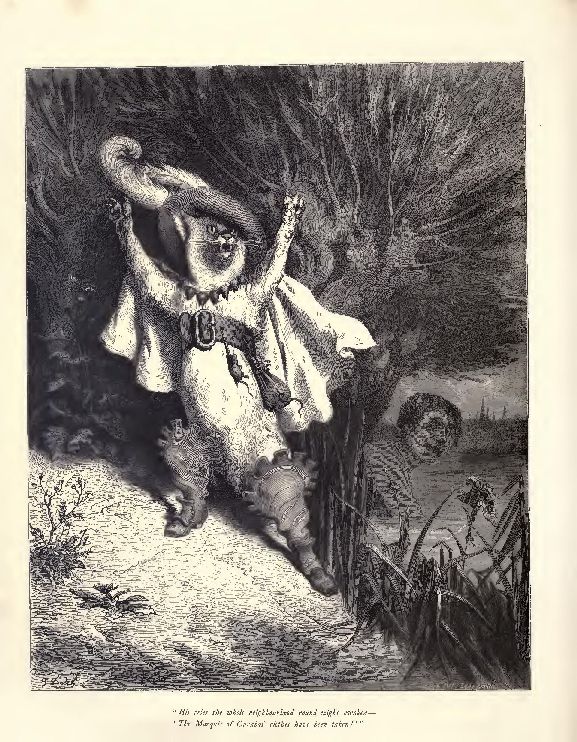
Then crafty Puss goes
And hides all the clothes
With grass and dead leaves; and when he perceives
The royal coach nearing him, loudly calls "Thieves!"
His cries the whole neighbourhood round might awaken—
"The Marquis of Carabas' clothes have been taken!"
Said the King, "Deary me!
What is it I see?
My good friend the cat up a tropical tree?"
Ah," said Puss, "my dear master has had a disaster,
For some one has cut—" "Cut! Oh, here's some court plaster."
"No, sire," said the cat,
"He doesn't want that.
He needs no court plaster, but needs a court suit;
For while he was bathing some mannerless brute,
Who had chosen the reeds and the rushes to lurk in,
Cut away with his hosen, knee-breeches, and jerkin."
"Is that all?" said the King;
"My servants shall bring
Whatever is needful—cloak, stockings, cap, sword, robe,
Gloves, collar, and doublet—in short, a whole wardrobe,
Each thing that he wants,
From castor to pants."
[Of course, you 're aware when a king takes the air
He's provided with changes of clothing to spare—
At least, so this legend would seem to declare.]
The servants produce for the Marquis's use
A rich velvet suit with gold trimmings profuse,
A rich velvet mantle with a lining of satin,
A diamond brooch stuck a point-lace cravat in,
While another the ostrich plume fastened the hat in.
These elegant clothes
Were couleur de rose,
With trimmings of green and with apple-green hose,
With noeuds of ruban, to encase his stout mollets
(For further particulars, please see Le Follet).
Our hero, attired in the garb thus acquired,
By the King's lovely daughter was greatly admired,
Who sat (as before I intended to state) on
The right of her pa in the royal "phe-ayton."
But I'm bound to confess
Our hero no less
Was charmed by her grace and her beauty in turn—
For if she liked his looks, he was ravished with "hern
Said the King, "My dear Marquis, it's really a treat
Thus to fall in with one I 've been dying to meet.
Pray take a seat,
And let me repeat
How much I'm obliged for your numerous presents
Of partridges, rabbits, grouse, woodcocks, and pheasants.
We 're going for a drive—pray enter the carriage.
Here's my daughter—she's yours, if you wish it, in marriage.
Any news? None, I fear:
Bread's still getting dear,
But the weather is fine for the time of the year.
I suppose we are passing here through your estate?"
So the King rattled on,
But the old miller's son,
Unable to answer, sat scratching his pate,
But Pussy cut in with, "Yes! though he's in doubt of it;
And for why? Dash my wig!
Because it's so big
He never can tell if he's in it or out of it.
But your Majesty, p'rhaps,
Will order your chaps
To drive to the castle, which certainly caps
Any castles you'll meet in a long summer day;
And, if you 'll allow me, I'll show them the way."
To Pussy's request the King promptly accedes,
Bids his coachman to follow wherever he leads,
And away the cat sped
A long way ahead
On a road that was bordered by corn-land and meads.
Pussy well knew
That the land they passed through
Belonged to a wizard—a mighty one, too——
Who, besides with the Evil One being "colloguer,"
(Don't think I, in quoting from "Arrah na Pogue," err:
It's what Shaun the Post says to Feeney,—the rogue—urgh!) *
Was that Middle Aged cannibal known as an ogre.
But where'er in the fields, as on they kept going,
They came upon labourers reaping or mowing,
Or ploughing or harrowing, weeding or sowing—
The cat ran before,
And cried out, "Give o'er!
Your master commands!" and the workmen forebore.
Said Puss, "He 'll approach
In a splendid state-coach,
And has sent me before him these tidings to broach,
And to bid you, unless you wish demons to tease you,
If the King, his companion, inquires who employs you,
With one voice in a moment, men, women, and boys, you
Must haste to declare,
With a satisfied air,
'The Marquis of Carabas, sire, an it please you!'
See! The carriage draws near!
Come, haste! Do you hear?
Quit all occupations,
And haste to your stations,
And give him the lowest of low salutations!"
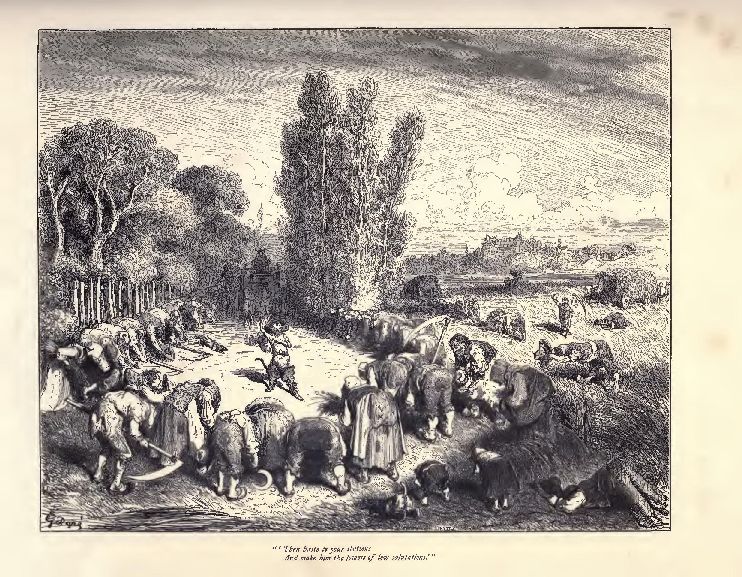
The poor people, afraid,
His orders obeyed.—
The Marquis himself became rather dismayed,
* This expletive, used to express utter loathing,
I scarcely can spell—
One really can't tell
How to put sounds in etymological clothing.
Thinking what was to end all these funny proceedings
Into which he was following Pussy's queer leadings;
But he felt he was sinned against rather than sinning
For Pussy strange fun
With the clothes had begun,
But what would the close be of such a beginning?
Still on Pussy speeds
By pastures and meads,
And the coachman still follows wherever he leads.
"Your estates are enormous—
Pray, Marquis, inform us,
If I may inquire,
Did they come from your sire?
He must really have been a most terrible lord,
Acquiring so much by the right of the sword.
I'm pleased to perceive,
With such riches to leave,
He'd a son of such merit
The wealth to inherit
Of so mighty a conqueror and enemy-killer."
"Yes," said the youth,
"To tell you the truth,
My late father had quite a renown as a miller."
The Princess smiled sweetly,
As if to hint neatly,'
Though she counted the father
A conqueror rather,
She fancied the son
Had a victory won—
In fact, she was sure—as the smile would infer—
About one of his conquests, and that was of her!
For she felt he was lord of her bosom completely.
And now the fields and meads they leave;
To right and left huge mountains rise,
And seem—so much their heights deceive—
With lofty crests to touch the skies.
Pine forests clothe their sombre sides,
Where dark ravines and gorges frown,
And many a mountain torrent glides,
Or bounds from ledge to ledge adown.
Their mighty wings the eagles flap
High up among the summits lone,
Whose peaks the snows eternal cap,
Or where the glacier billows groan.
But in the plain about the base
Of this portentous mountain chain,
The signs of human toil they trace,
And find men labouring again.
Here, turned by some wild torrent's force,
Huge wheels revolve with busy hum;
There some vast chasm stops their course,
Whose depths the eye would vainly plumb;
Or, laden deep on shrieking wheels,
Toil waggons up the steep inclines:
Their load the mystery reveals,—
This region is a place of mines!
As soon as Puss got to this desolate spot,
Addressing the miners, he kept up the plot.
"See your master approach
In the King's grand state-coach;
He has sent me before him, his orders to broach.
"'Then haste to your stations
And make him the lowest of low salutations'"
If you don't wish the gnomes and the kobolds to seize you,
When asked whom you obey,
Be certain to say,
'The Marquis of Carabas, sire, an it please you!'
When His Majesty's Grace
Appears on the place,
You must bow till each one touches earth with his face!"
To every word
That from Pussy they heard
The miners attended—
Low bowed and low bended;
And when the King came,
And asked them the name
Of their master, they answered him all just the same.
And I'd just hint to you
That as thus this whole crew
Of miners obeyed—minors always should do.
But now having passed through this wild tract at last,
They came to a plain greenly wooded and vast,
And spied out, half hid
A thick forest amid,
A castle that stood on the crest of a hill,
Or the brow of a rock—you may choose which you will;
For the hill was so steep
The road had to creep
Round and round from the baser
To the gates of the place,
Though Pussy went straight up the side at full chase,
While slowly around
The royal coach wound,
The horses got pretty well tired, I 'll be bound,
For such roads will e'en puzzle a nag that is sound.
Half-way to the top Puss in Boots made a stop
Not because he was tired and quite ready to drop,
But because he encountered a dame and her goodman
And child—by profession the man was a woodman—
And wished to inquire
Ere he went any higher
If this past all doubt was the castle and dwelling
Of the wizard of whom I have elsewhere been telling.
So, making a bow, he said, "Pray allow
Me to ask you one question that struck me just now—
That castle that rises
To dazzle our eyes is
The abode, I suppose, of a man of position:
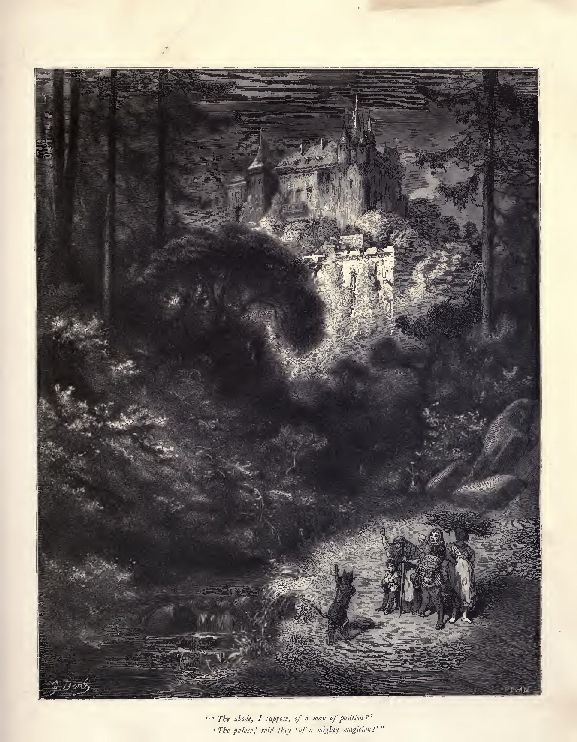
"The palace," said they, "of a mighty magician,
So harsh and severe he's regarded with fear
By all the poor people who dwell about here;
The best course, if you asked us, that we'd recommend to you,
Is not to go near him—he may put an end to you."
Said Puss, "Never fear, for I'll persevere
Till the neighbourhood I of this wicked one clear."
So he went on once more, till reaching the door
Of the castle, he gave with the knocker a score
Of such rat-tat-tat-tats, to the blush as would put man-
-Y thundering knocks by a real London footman.
The door was flung wide, and Puss stept inside,
But not an attendant there was to be spied—
Nought but a hand
Bearing a wand,
That pointed the way with a courtesy bland,
By corridors gorgeous, up staircases grand,
Through halls by arched ceilings, all painted, o'erspanned,
Along galleries brilliant with lovely stained windows,
Whose curtains were made
Of that Indian brocade
Which Great Britain, 't is said, to the conquest of Scinde owes;
Though the wizard of course got his curtains by witchcraft,
Not by merchant-ships, P. and O. steamers, or sich craft.
At length doth Puss enter
A hall in whose centre
The Ogre he spies, cui Cyclopius venter.
(Which, translated, would mean "as a matter of taste,
His figure and form ran a good deal to waist."
He has taken his seat,
Preparing to eat
An enormous repast of all manner of meat—
Beef, mutton, and veal, each in separate bowl—
And the different beasts are served up to him whole;
And there's one dish, moreover,
That Puss can discover,
That strikes him with horror and harrows his soul—
Babes of quite slender years (that means tender, not thin, age)
Piled up on a dish (and no gammon), and spinach.*
Puss, nothing daunted
(Although 't will be granted
The sight in some hearts might have terror implanted),
Walked straight to the board
Where the monster abhorred
At the servants attending him bellowed and roared;
And servants sure ne'er on their master attended
With such an unwilling respect as those men did!
"Rascals of mine!
Bring me some wine,
Or I 'll cut you in sunder from head-piece to chine!"
* In thus making spinach
'To rhyme as with Greenwich
I 'm authorised wholly
By Anthony Rowley,
Whose edito princeps (of course it's a foli-
-O) spells the word s.p.i.n.n.a.g.e—
And if any should know how to spell it, 't would be he.
Alarmed at the speaker,
One brought a big beaker
Of wine—one-tenth part had floored any one weaker.
But the Ogre held up the great glass to his eye
In a critical way,
Smacked his lips, just to say
"That 'll do!" and then all at one gulp drained it dry,
And set down the goblet. [I cannot see why
It is called so, and count as a regular puzzle it;
For since it's to drink,
Not to eat from, you'd think
They'd, instead of a "gobble-it," call it a "guzzle-it."]
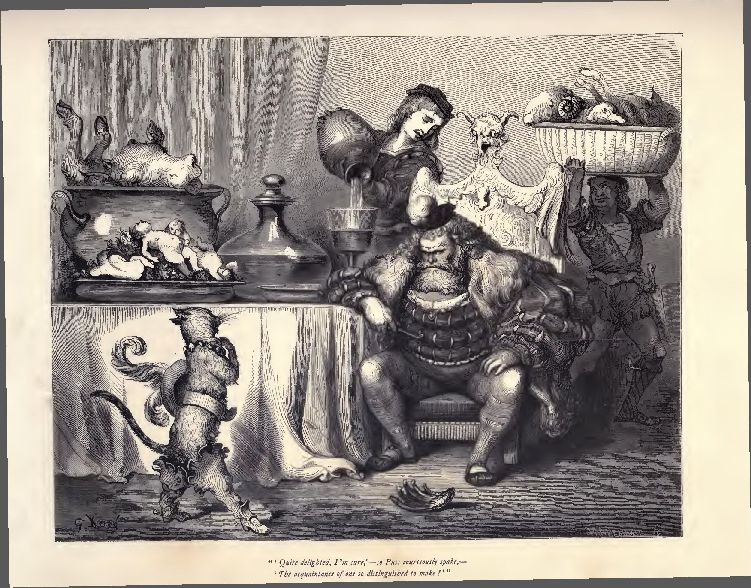
Drawing near the huge chair with a reverent air,
With knee lowly bent, hand on heart, and head bare,
"Quite delighted, I'm sure," so Puss courteously spake,
"The acquaintance of one so distinguished to make,
For skill that's gigantic in arts necromantic,
Whose fame—not to speak it in terms sycophantic—
Is driving with envy all wizards quite frantic,
European, or Asian, or e'en Transatlantic!"
Here Puss bowed again with a courtier-like antic.
Even wizards, I fear, or so 't would appear,
Cannot always, unmoved, artful flattery hear.
The Ogre said, "Ugh!
Pray who are you?
In return for these compliments what can I do?
For since I'm not vain, it seems pretty plain
You would not tell me this without some hope of gain."
Says Pussy, "Quite right—you 're very polite—
Of your magical powers I'd fain have a sight.
There's one now report says is yours, the which borders
On what is impossible." "Pray give your orders,
And I 'll open your eyes with a little surprise,
And prove that report does not always tell lies."
"Well, since you're so kind—what a wonderful dodge I call
Is the power of assuming all shapes zoological—
Ape, bear, lion, elephant, wolf, hippopotamus
(The latter a beast
Scarcely known in the least
Till the Pacha of Egypt obliging got 'em us),
Tiger, peccary, leopard, gnu, paradoxurus;
Or e'en if you wish
A bird or a fish—
The penguin, for instance, or Buckland's silurus."
Said the Ogre, "He! he!
You quickly shall see—
That's only child's-play to a wizard like me!"
So without more ado, hands and knees on he sunk,
His ears turned to flaps, and his nose to a trunk,
And his form all at once took so quickly to swelling,
He threatened to knock off the roof of his dwelling.
"Bravo!" cried the cat; "that's capital, that!
You 're almost as big as the Heidelberg vat!
But can you now, please, with just as much ease
Into smaller dimensions at once yourself squeeze?
Say, turn from the elephant, big as the house,
Sans any embarrassment, into a mouse?"
Bulk, big legs, and trunk
Immediately shrunk!
In three seconds—no more—
Was a mouse on the floor
Where the elephant stood but an instant before.
At one bound, quick as thought,
That mouse Pussy caught,
And before any aid from his charms could be sought,
Or help could be had from the spirits who followed him,
Had given the magician one grip—and then swallowed him!
Then back to the door
Puss hastened once more,
Just in time to receive the state carriage and four.
He helped to descend
His master and friend,
Who was still in bewilderment how it would end,
And proceeded to bring
The Princess and the King
Through all the grand rooms,
Where pages and grooms—
Who were glad with the Marquis their old situations
To hold in the castle—made low salutations.
To cut my tale short,
They returned to the court,
And, since nobody wished their attachment to thwart,
The young folks were married,
And he his bride carried
To his castle, where happily ever they tarried;
And the cat was provided—
The King so decided—
With a cushion of silk
And a gallon of milk
Every day of his life till the day that he died-ed.
I 've only to add
The fortunate lad
Sent and fetched his two brothers so cruel and bad,
And recalling the past
To their memory, at' last
Told his present good fortune, which made them aghast;
And then, bidding them better in future behave them,
To be nobly revenged on them both—he forgave them!
THERE once was a Baron who dwelt at the top
Of a rock by the Rhine,
Whence, whene'er he'd incline,
Upon travellers that way he was ready to drop,
And lighten their purses—
Which brought many curses
On the head of the Baron of Snitherumpopp
For a practice, which now
We shouldn't allow,
And, in fact, the police would immediately stop.
Hard by where the Bar(i)on *
These strange tricks did carry on
There lived a young Prince, who by flourish of clarion
Proclaimed unto all, both great folks and small,
He intended to give a great banquet and ball—
Or, to use modern language, a spread and a hop:—
'T was good news for the daughters of Snitherumpopp.
For the Baron, you see, had daughters three,
The two eldest as ugly as ugly can be,
And prouder than Lucifer—(no! I must scratch
That through. For they'd waited so long for a catch,
It's not true that their pride was above any match)—
But the youngest was fair, with beautiful hair;
Her sisters looked on her with rage and despair;
And that they'd have no chance they declared past a doubt,
If that "forward young minx" was allowed to "come out."
* At this new mode of spelling the word don't feel shy—
I have seen a Baron with more than one eye!
So for fear of her beauty their lovers bewitching,
They compelled her to stop
In that wretched cook's-shop
Which is—by its own denizens—christened the "kitching."
In clothes very mean they compelled her to clean
Pots, kettles, and pans—implements de cuisine.
In her pa's worn-out gloves
She polished the stoves,
Poker, shovel, and tongs, and whatever belongs
To the role of what Stubbs * calls "say po-vers onfongs,"
The General Servants—or Maids-of-All-Work,
Though this last is a name they seem anxious to shirk,
Or at least as a rule in advertisements burke.
Though far from robust, she'd to sweep and to dust,
And to see dinner cooked, when skewered rightly or trussed,
(Though dining herself off a scrap and a crust,
While if aught turned out wrong by her pa she was cussed)
Not to mention, en passant, the fact that she must
Chairs and tables adjust; and, from last unto fust,
See that all things were clean from dirt, mildew, or rust.
(For this last she used paper, which is, unless memory
Deserts this poor brain altogether, called Emery.)
[N.B. Any doubt on the point to enlighten,
I don't mean the actor, although he's a bright 'un.]
When the ball was announced, off the two sisters bounced
To send their best dresses to have them re-flounced,
And soon became clawers from various drawers
Of fans, flowers, gloves (by the shopman styled "strawers"),
Trimmings, ribbons, and laces, to add to the graces
Of their very poor forms and their very poor faces.
* Of scenes continental Poor Stubbs has been viewer
But once, though he speaks of his trip as "mong two-er."
I must own that they were (since plain speaking de rigueur 's)
What tradesmen denominate "marked in plain figures!"
One routs out a scarf, one contrives to unearth a
Compound of tulle
And ribbons which you 'll
Hear described by your sister or wife as a Bertha.
The eldest's inclined to declare for a tarlatane,
Either an emerald green or a scarlet 'un,
With a silk under-petticoat known as a slip;
While the second decides double skirts are "the tip."
(What "the tip" means you know, though one can't see the point of it.
I'd not use the slang, save that rhyme makes a joint of it.)
At last draws near the festal day!
The ball's to last three nights, they say.
What a hustle and bustle—oh, dear! what a fuss 'll
Be made when the ball-dresses whisper and rustle,
I 'll warrant that scuffle
And noise quite enough 'll
Be made when along the oak floors their feet shuffle,
While the band are all playing as hard as they 're able
The popular waltz of the season—the "Mabel."
While her unprepossessing
Two sisters are dressing,
Cinderella to do all the work, I'm afraid, is made,
Not only of general servant, but lady's maid.
She lays out the robes by which each so much store sets,
Takes things down to air,
Cleans their shoes, curls their hair,
Pins their sleeves, hooks their dresses, and laces their corsets.
And now they're both drest,—each, looking her best,
Is prepared to become at the Prince's a guest.
They 're gone! And yet neither her thanks has conveyed
To poor Cinderella for lending her aid;
They 've not wished her good-night—they have not even kist her,
Though for once they 've allowed her to act as assister.
She could not but feel it, her heart being tender,
So she sat down and had a good cry on the fender;
When—as good Mrs. Brown,
Of world-wide renown,
Whose figures of speech may, without any bosh,
Be described as "the things that come home from the wash,"
Says—"All of a suddin"
The room was a flood in
Of light! Cinderella, surprised, said, "Oh, Jim'ni!
The soot must have caught and set fire to the chimney!
But no! t' was not so!
The beautiful glow
Was not due to an accident—quite the contrairy—
Altogether another affair,—and a fairy!
Cinderella had got what now-a-day not
Very often has fallen to any one's lot,
As I fancy you can't but instantly grant
When you learn it's a fairy by way of an aunt.
This benevolent fay has called in, in this way
To hear what her favourite niece has to say,
And to send her, if any desire she evinces
To share in the fun, to the ball at the Prince's.
When she said, "Will you go?" she didn't say, "No!"
But answered, "Just shouldn't I, aunt!" adding, "Oh!
How I wish I'd a ball-dress—one fit for a belle—a
White muslin with tucks!" "So you shall, Cinderella.
But first we must get you an equipage proper.
You'll find some black-beetles down there by the copper;
There's a rat in the trap, and some mice, too, mayhap,
And there's also a lizard, a little green chap,
On the grass-plot before the scullery door.
Bring them here, there's a dear. Stay, I want one thing more—
A pumpkin! And yonder I see, if my eyes
Don't deceive me, a pumpkin exactly the size!"
Cinderella soon sought the things out, and brought
To her aunt, who, by magic as rapid as thought,
Turned the beetles to pages, and made of the rat
A coachman, all powder, bouquet, and laced hat.
As for the mice, they became in a trice
Eight cream-coloured galloways, worth any price;
And the lizard—she made that most active of friskers
A footman!—with livery, calves, and big whiskers.
"And now, dear," said she,
"For a coach we must see!
Now pumpkins—some fry 'em, some boil 'em, some stew 'em,
But no one before ever made one a brougham." *
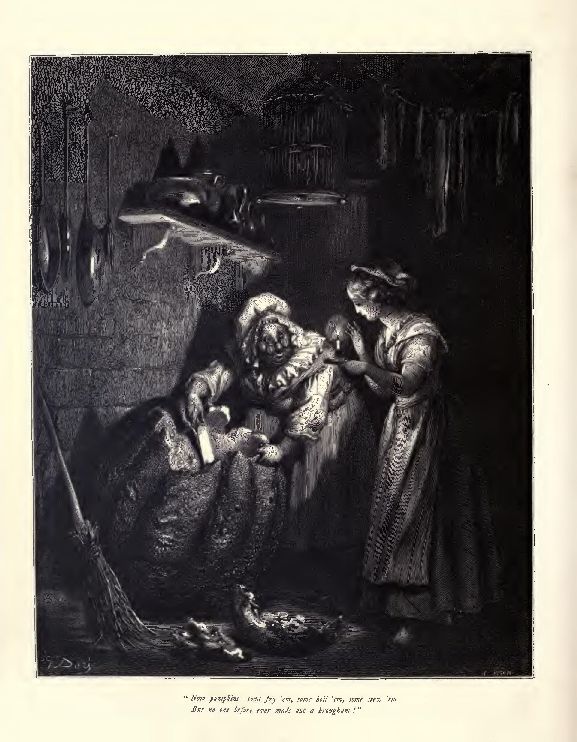
At once—although strange you may fancy the change,
And think I am drawing a bow at long range-
The pumpkin (of that as cock-sure as a bantam I'm)
Turned to a coach like a trick in a pantomime.
Then the worthy old fay touched her niece's array—
Rags and tatters all vanished at once quite away,
And, lo! in their lieu, she appeared to the view
In a ball-dress of fashion the newest of new!
She'd such lovely jewels-
The thought of them cruel's!-
Not at Hancock's, or Ryder's, or H. Emmanuel's,
Or the shops of some forty more-
(Say Storr and Mortimore,
Hunt and Roskell, or any besides of the many
Where on things of the sort you may spend a nice penny)-
* No! But at the Adelphi some folks "I 've heard tell on"
Are often quite carried away by a Mellon.
Could you ever procure such pearls, diamonds, and top az:
I very much doubt if their equal the Pope has;
Though there are (so I've read in a newspaper par.) a
Good many gems in the papal tiara!
But what sort of shoes had the sweet Cinderella-
Polished leather, white satin, French kid, or prunella?
No! not one of those hid her dear little toes.
She wore—can't you guess?—now what do you suppose?—
She wore—come, you know what she had pour ses souliers?—
She wore—as A. Ward would remark, 't was "pekoolier"—
She wore, to be brief, then, a pair of glass slippers,
And what vulgar rapture calls "regular clippers!"
"And now," said her aunt, "your sisters may flaunt,
And fancy they 'll catch the young Prince—but they shan't!
There's one thing, however, I'm anxious to mention-
And I beg you will give to my words your attention:
If you stop at the ball till the hours that are small,
Your jewels and finery'll vanish—that's all!
So when twelve's drawing near be careful, my dear,
And to get away safely take five minutes clear.
Yes; at five minutes to, pray take your adieu,
Or something may happen you 'll long have to rue!"
Cinderella, quite charmed with her gorgeous array,
Scarce had patience to hear what her aunt had to say,
But the moment she seemed to be making an end to it,
Kissed her, and promised she'd strictly attend to it!
Cinderella steps into her carriage and eight,
Tantara-tantara-ta!
With coachman, and footmen, and pages of state,
She is driven away to the Prince's grand gate.
Tantara-tantara-ta!
Oh, didn't they think she was somebody great!
Tantara-tantara-ta!
The Prince's Lord Chamberlain rushed to the door,
Tantara-tantara-ta!
And bowed very low that fair lady before,
While retainers and guards crowded round by the score,
Tantara-tantara-ta!
And even the solemn old porter said, "Lor!"
Tantara-tantara-ta!
The Prince, when he heard all the hubbub and din,
Tantara-tantara-ta!
Came down the grand staircase, and held out his fin
To the fair Cinderella, and welcomed her in,
Tantara-tantara-ta!
And a very sweet smile was so blest as to win.
Tantara-tantara-ta!
He leads her to the ball-room. As they enter,
At once all eyes on Cinderella centre.
Each noble of the land, well-born or grand,
Desires the honour of her tiny hand.
The women all are on the hooks styled tenter
To learn who she can be,
Though "really they can't see"-
Like female jealousy there's no fermenter
For turning tempers naturally placid
Into a bitterly corrosive acid-
"What all the men could find in her to praise-
They'd ne'er met one more plain in all their days.
Her clothes were fine,
And did with jewels shine,
But then, you know, they'd probably been lent her."
What need to enlarge?—It appears woman's duty
To differ from us upon questions of beauty.
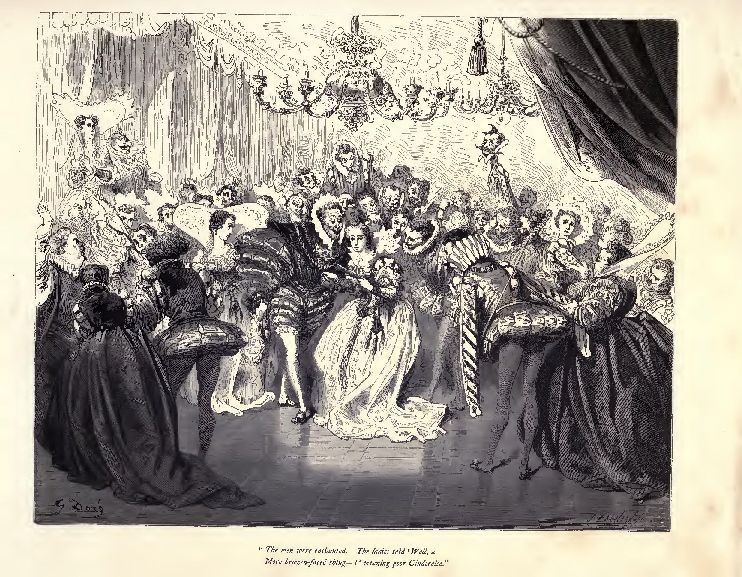
The men were enchanted. The ladies said, "Well, a
More brazen-faced thing—!" meaning poor Cinderella.
(The dissension of belles,
As experience tells,
Is one of the oldest of horrida bella.)
The Prince claimed her hand for the very next dance;
Cinderella consented, but gave him a glance
That set his heart dancing with passion and pleasure
Much faster by far than his feet danced the measure.
"Now 's your chance,
Miss, to dance.
Hark! they play the 'Mabel.'
Who'd be false
To such a waltz,
If to spin he's able?
"Faster they
Ought to play-
Can't they do it quicker?
No, that ass
The double-bass,
He's far gone in liquor.
"O'er the floor
One round more
Will not tire, I trust, you."
"Only one—
And now it's done
I'll sit down." "Oh, must you:"
For dance after dance his delight to enhance
The Prince asks her hand; no one else has a chance!
While young ladies and old, "left out in the cold,"
Shake their heads at such doings, and say that it's "bold!
But the Prince doesn't care for any one there
But his own darling partner, so gentle and fair
(Which is more than his conduct is—so they declare).
At last Cinderella looked up at the clock,
One minute to twelve! What a terrible shock!
In two seconds more she is out at the door,-
She has no time to wait, but runs to the gate-
It's well no one sees her, because she's too late:
The clock has struck twelve. The enchantment is o'er
The guards who were stationed each side of the portal,
When questioned, said they
Had seen none pass that way
Except—yes! one scullery-maid, a poor mortal,
All rag, patch, and tatter, but didn't look at her.
The porter declared he knew nought of the matter;
At the door as he sat he'd seen nothing thereat
But a pumpkin, a lizard, some mice, and a rat.
The Prince, who'd rushed out to look after his partner
And hand her downstairs
To her carriage, declares
He can't make it out—"It is quite a disheart'ner!"
However, next night he feels it's all right
When he sees her again at his palace alight.
Once more by his side through the hall she will glide—
And if he's a chance,
In the midst of the dance
He '11 ask her permission to make her his bride.
Cinderella, taught wisdom by yesterday's scrape,
Though enjoying the ball,
Watched the clock on the wall,
And in plenty of time from the room made escape.
But the Prince, looking out very sharply, no doubt,
Saw what his mysterious guest was about-
So sent for a follower trusty and tried,
And said he was yearning the name to be learning
Of the lady just gone to her carriage outside;
And so he must ride
A little way on—say just down the next turning-
And follow the coach, let whatever betide!
The Prince then conducted the fair to her coach-
But in vain did his vassal await its approach
To ride in its track, so at last he came back.
At the news of his failure his master looked black,
And instead of a money-bag gave him the sack.
The next night came round—once more the Prince found
His love at the ball—and his heart gave a bound!
In the midst of the hop the question to pop
He determined—and nought his intention should stop.
How sweet are first love's tender words
As on the ear they fall!
More musical than song of birds-
More sweet than whey, more soft than curds,
So welcome to us all.
And, ah! to Cinderella's ear,
Who'd heard so little love,
How were the Prince's accents dear,
Which her fond heart could plainly hear
All other sounds above!
Her aunt's directions to her niece
Young Cupid makes her shelve;
When suddenly her joy must cease-
The clock upon the mantelpiece
Is on the stroke of twelve.
One! run-
Two! through-
Three! the-
Four! door.
Five! look alive!—If you do not contrive
To be out of the place ere the clock strikes twice six,
I guess, Miss, you 'll be in a tall sort of a fix.
She is off and away without any delay,
Ere the Prince can get rid of his fear and. dismay:
Off down the stairs
Like a mad thing she tears-
When one of her slippers, small blame for that same,
Slipt off altogether, quite true to its name;
So the Prince when he came
To the top of the staircase his love to pursue,
Found that she was a slipper—but left him a shoe.
What was he to do? He put two and two
Together at once, "calculating" like Babbage;
And as Taylor would say
In adapting a play,
Remarked, "If that's choux, I will make it my cabbage;
The guards were all questioned, but nought could he glean;
They had carefully watched, but had nobody seen
Except one poor beggar girl, ragged and mean.
£; Who," so one observed, "from her beautiful colour, he
Thought had been scrubbing the pans in the scullery."
The very next day, in the usual way,
His nobles he sent, with a herald, to say,
That the fortunate fair
Who could easily wear
The slipper which they on a cushion then carried
Would be by the Prince instantaneously married.
"Pooh!" say the ladies, as each trial made is,
"Only fit for Chang's lady, that shoe, we 're afraid, is.
You'd better convince that foolish young Prince,
If he waits till it's fitted—the fact not to mince-
He 'll finish at last by not marrying at all;
The slipper is really too foolishly small!"
But in spite of their sneers, they were all half in tears,
And to get on the slipper bad given their ears;
Indeed, there were those who cut off their toes
To try and contrive it—or so the tale goes.
Cinderella's two sisters were fiery as blisters,
And abused the young Prince and his learned ministers,
Altogether, as Toole would observe, "just a-goin' it!"
Because, if you please,
When each tried to squeeze
The shoe on, she scarcely could get her big toe in it.
When they 'd done, Cinderella sat down in the chair:
Oh, didn't they stare with contemptuous air!
While each to the other said, "Well, I declare!"
But when the lords put
The shoe on her foot,
Without any ado it slipt into the shoe—
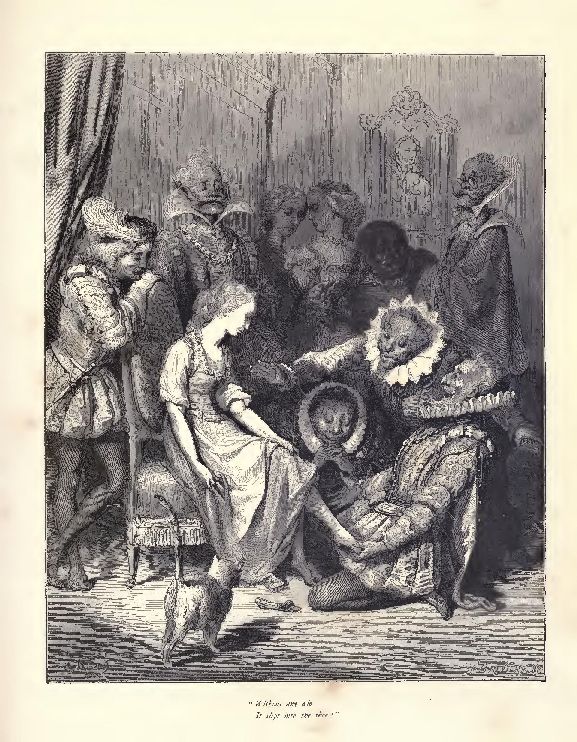
Said the Prince in a trice, "I 'll wed none, love, but you!" What more? The good fairy returned on the scene, And, instead of the garb which was really not clean, At a touch of her wand, in a dress of rare sheen Presented her niece to the Prince who had been So faithful and fond, and who made her his Queen. [From the "Post" you will all the particulars glean Of the marriage performed the two parties between By a Bishop, assisted by Canon and Dean.] Her sisters were very near dying of spleen, And thought their aunt's conduct remarkably mean, But lived as neglected old maids, spare and lean (Though they'd never acknowledge to more than nineteen). So there's no more to tell a- -Bout sweet Cinderella, Whose life was quite happy—in fact, "all serene!"
UPON a forest thick and gloomy
A cottage, the reverse of roomy-
To put it plainly, just a hut
And nothing better—did abut.
'T was built of clay and roofed with straw;
The walls had many a gap and flaw;
The chimney wouldn't always draw;
The floor was damp, the ceiling leaky;
With stains of rains the walls were streaky.
Around the hearth, where seldom smiled
A blazing fire, were faggots piled
As if for fuel-
Oh, mockery cruel!
For they were heaped from floor to raft-
-Ers as a check upon the draught.
The fires that used that draught to flicker to
Consisted only of a stick or two,
Enough to warm a mess of pottage.
Pshaw! why waste time
In spinning rhyme,
When one can easily contrive
To picture it with words just five?-
The usual "English labourer's cottage."
There dwelt a goodwife, and her goodman,
Who by profession was a woodman,
But was so poor and so prolific
(A family of seven's terrific
To one whose trade is not first chop),
That oft when trees he'd limb and lop
He wished—his lot did him appal so-
That he could cut his own stick also.
But while he in the woods was hewing,
What, think you, the poor wife was doing,
Who had to sit at home, and see
Her children gather round her knee
With looks that, plain as words could utter,
Said, "Please, we want some bread and butter" r
What could she do but sit and sigh,.
While bitter tears bedewed her eye?-
His was the "hew," but hers the "cry."
Her household duties were but few:
When she had clothed the infant crew,
The toils that as a rule belong
To cooking, did not take her long;
They never tasted meat, to vary an
Eternal diet vegetarian.
And well we know, to rear a troop
On turnip broth and carrot soup,
And ne'er taste "pieces of resistance,"
Is vegetation, not existence!
Said the husband one night
As they sat by the light
Of a fire that for them was uncommonly bright, *
"My dear, we have got
One carrot—and not
A single scrap more to put into the pot.
* How it flickered and flared has been drawn con amore
By that notable artist of artists, G. Dore.
We 're as poor as church mice, and there's nothing much surer
Than that we every day shall grow poorer and poorer.
And what for our brats
Can we do, my love? That's
The question that gnaws at my heart 'like green rats!'
It's long since we had any victuals to carve,
But now we 've no soup
To spoon out for the group-
What is to be done? for we can't see them starve."
The wife shook her head,
And mournfully said,
"If we have not the food, why, they cannot be fed;
Unless we find heart to entrust them all seven.
To the Power that feeds
And attends to the needs
Of the wild things of earth and the winged things of heaven."
Said the father, "That's true!
It's what we must do-
We 'll take to the forest the poor little crew
By roundabout ways, all the more to confuse them;
And then, when we find they 're not looking, we 'll lose them."
Here the reader polite 'll
Allow the recital
To pause while they 're settling a question so vital;
And I, in requital,
To make it all right, 'll
Explain how my story has come by its title.
The last child that was born
To this couple forlorn
Was tiny in figure;
Not very much bigger
Than the wee dancing dolls that one sees in an organ;
Or rather, so small
That no figure at all
He'd, I think, have been called by Professor de Morgan,
But—devoted to fractions most infinitesimal-
That diminutive point which is known as a decimal.
So, though he was a boy,
And we do not employ-
Says the grammar that Eton lads always enjoy-
For the masculine omne quod exit in um,
They christened the little one Hop o' my Thumb.
The father regarded the child with surprise;
And his mother, poor woman, shed tears for his size,
For she felt as she looked at her babe the misgiving
That so little a boy could but make a small living.
And as he grew older
Still every beholder
That he didn't grow bigger at all always told her;
But then as some comfort they all of them found him
Possessed of great nous,
Though the size of a mouse-
For though he was little, they couldn't get round him.
Now it chanced on the night that begins my narration,
When his parents were holding this grave consultation,
Sleep would not come
To Hop o' my Thumb-
He was on the alert "a remarkable some;"
So he sat up in bed,
And there by the red
And flickering light that around it was shed,
By the glare of the log
Saw the cat and the dog-
She was poor as a rat;—he'd a waist like a frog,
Or a greyhound—but due to the absence of prog,
Not the presence of breed,-
He resembled, indeed,
He saw on her cheek a tear-drop glisten,
So he hid himself under her chair to listen
The nags that you see in a cab-driver's stud,
Whose "points" are all owing to bone, not to blood.
There his father and mother
Too sat by each other,
Conversing in tones they seemed anxious to smother,
And he saw on her cheek a tear-drop glisten,
So he hid himself under her chair to listen.
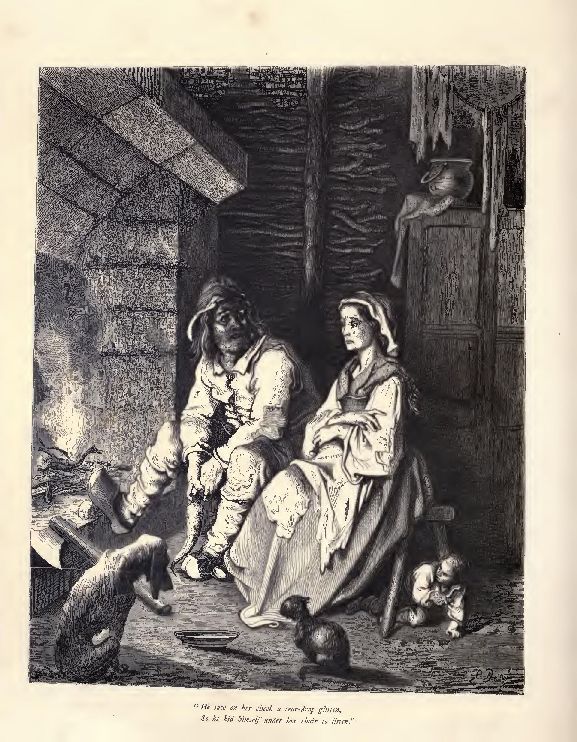
What did he hear?-
He regarded with fear
Being left in the forest so dismal and drear!
And all for no good,
For 'twas likely he should
Get wholly mislaid, like the Babes in the Wood,
Whom (see story) with leaves the kind robin, alack! buries,
When they eat, by mistake, deadly nightshade for blackberries!
In a state of despair,
Hidden under the chair,
Poor Hop o' my Thumb heard his parents declare
That the first thing next day they would make the excursion
Which, so they determined, should end in desertion.
"What's to be done?
This is really no fun:
I 'm the wretchedest mortal that's under the sun.
To bed I must creep—
But awake I will keep,
For what I've to do is to think, not to-sleep,"
Said Hop o' my Thumb,
When his father said, "Mum!"-
To his mother, intending that she should be dumb
On the subject that late
Had formed their debate-
"I think you had better get breakfast at eight."
The boy stole to bed,
To turn o'er in his head
The things which his father and mother had said,
And discover, if possible, 'cute little chap!
As well as he can,
Some snug little plan
To guard him and brothers against a mishap.
One thing was clear:
When they started from here
He some landmarks must leave by which homeward to steer;
For if he'd the means to discover the track again,
Go where they would, he could find his way back again!
But in vain to devise
Some guide-post he tries,
Till he's quite wearied out, and sleep closes his eyes.
But while he still sleeps,
On a moonbeam down sweeps
A fairy: beneath his closed eyelids she peeps,
And finding him busy on all sorts of schemes,
To aid his escape
From the morrow's sad scrape,
She a cunning suggestion slips into his dreams.
Where lofty oaks deep shadows make,
And ceaselessly the aspens quake,
Where ancient elms their branches spread,
And ashes whisper overhead;
Within the forest's darkest glades
There flows a stream among the shades,
Above its wave a hoary group
Of melancholy willows droop.
The kingfisher its waters loves;
'T is haunted by the startled doves;
And, free of fear, beside its brink
The dappled fawn oft stops to drink.
'T is fed by twenty tinkling rills,
And here and there—where sunlight spills
Through openings in the boughs o'erhead
A halo, yellow, azure, red-
A tiny rainbow bright and small
Hangs o'er the mimic waterfall;
Where through the overarching green
Bright glimpses of the sky are seen,
The dancing waters as they go
Mirror the snatch of blue below.
Long mosses wave within its stream,
And silvery fishes glance and gleam,
And water-lilies float and sail.
But these do not concern my tale.
My point, the mystery to unravel,
Is, that the bed of it is gravel,
And that its bays and banks abound
In pebbles small, and smooth, and round.
By the side of this stream,
As he walked in his dream,
It appeared that the pebbles all set up a scream,
"Hop o' my Thumb!
Come hither, boy, come;
If we cannot show you the way it is rum!" *
At the first streak of day
He is up and away!
He creeps out of the house through a crack in the
* At the slang the stones speak don't, I pray, be offended:
How their schooling's neglected
Must be recollected—
Just remember how often roads have to be mended!
Off like a rocket
To fill every pocket
With stones—precious stones, though not fit for a locket
Brooch, bracelet, or ring,
Or any such thing-
But precious to him for the help they will bring.
Away must he go
Like arrow from bow,
Yet all in a quiver,
And reaches the river.
The scene is a taking one, though this is a giver
Of peaceful delight,
Full of charm for the sight
That reads all the beauty of Nature aright.
On the bank of the stream
Rests one fleeting gleam,
Where the bluebells and dainty anemones teem,
And there rises o'er them
The grey hollow stem
Of an old pollard willow; while many a gem
From the waters is hung
Leaf and blossom among,
For 't is here that the stream's sweetest madrigal's sung.
But what does he care for song, bluebell, or pollard?—
There are the jockeys that have to be collared.
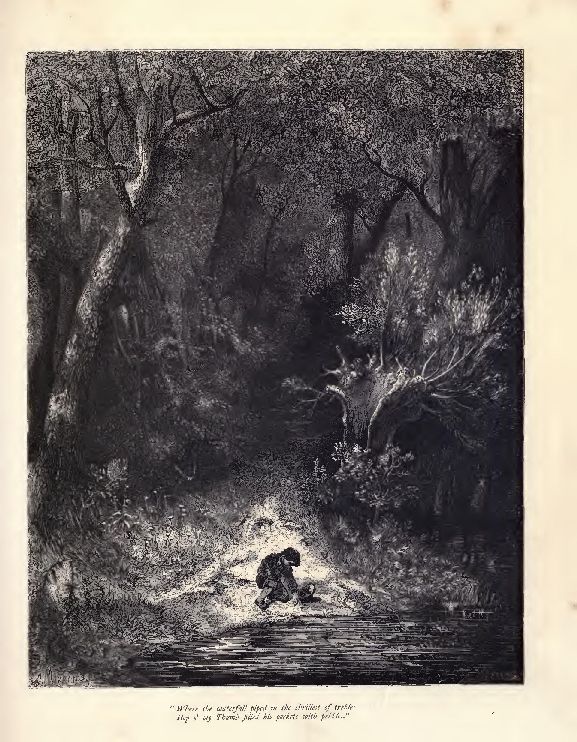
Down on his knees he. went, if you please,
And oblivious of sunshine, and blossoms, and trees,
Where the waterfall piped in the shrillest of trebles
Hop o' my Thumb filled his pocket with pebbles.
Then homeward he stole,
Returned through the hole,
And crept into bed, not disturbing a soul;
But feeling the danger completely forestalled.
Curled up, and slept soundly until he was called!
At eight o' clock the mother rose,
And donning mournfully her clothes,
Lit up some sticks and put the kettle on,
As she and he did last night settle on:—
The water boiling, in goes, souse!
The one last carrot in the house.
The hapless mother can't but feel
In any case it's their last meal;
For even if they now gave up
The plan on which they had agreed,
There's nothing left,—nor bite nor sup,—
Her hungry, starving babes to feed.
Less pain 't will be, she feels, poor mother,
To lose them one way than another.
And so this poor Hagar
Prepared her soupe maigre,
While grief and perplexity harass and plague her.
And soon as their eyes
Are open, with cries
Of "Oh, we 're so hungry!" the little ones rise.
While the father, who's not
Very great at a plot,
Conceives that his plan some more treachery lacks;
So in order to hatch it, goes out with his axe,
And makes an attempt at restoring his mind's tone
By setting the edge of the blade to the grindstone.
The poor little souls
Sit down to their bowls,
And eat up their pottage without any rolls.
It's not a remarkably nourishing diet,
But it eases the pangs
Of hunger's sharp fangs,
And the wolf in the stomach keeps partially quiet.
But the mother's afraid
It's far from well made,
For the carrot's fine flavour and strength haven't stopt in it,
And it's rather too salt—from the tears that have dropt in it.
However, no matter!
They clear out each platter:
In expecting a share of the soup, dog and cat err;
If they want a first course they must e'en lick the dish for it,
And as for the second, they 'll have to go fish for it-
A third they 'll not meet with, however they wish for it.
So the table was cleared;
The cloth disappeared:
And then came what Hop o' my Thumb had so feared.
Said the father, "Come, children, I'm off to the wood,
And I 'll take you all with me providing you 're good.
There are lots of wild fruits,
Not to mention the roots,
And the hawthorns are putting forth midsummer shoots.
You 'll have plenty to eat-
'T will be really a treat;-
So run to your mother, and all be made neat!"
Off they ran in great glee
To their mother, and she
Did the best that she could for the boys; but, you see,
A respectable look's not the easiest of matters
To give to clothes made of shreds, patches, and tatters.
However, at last, inspected and passed,
They set out for the forest so gloomy and vast.
The father goes first with his axe on his shoulder,
The next place was the mother's,
And then all the others;
First he of the brothers
Who is than the rest of the family older,
And so from the tallest
Right down to the smallest,
On a scale that would greatly amuse a beholder.
And, pray, who last of all should come
But the mite of the family, Hop o' my Thumb r
Trudging along,
Humming a song,
As if he were quite unsuspecting of wrong,
But keeping an eye
Very much on the sly
On the various objects the road took them by,
And here and there along the track
Dropping a pebble to guide him back.
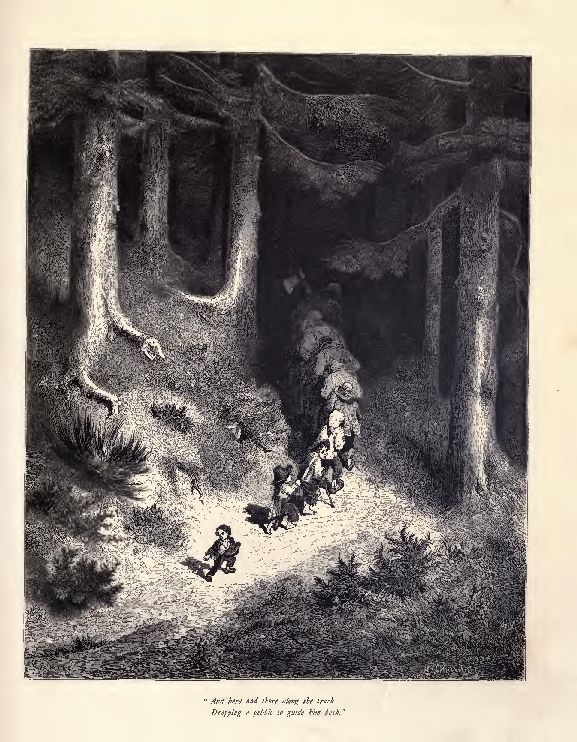
On they went still, mounting a hill
In the sort of locality papers call "ill"-
That retired kind of spot
You would look on as not
An unsuitable place for the scene of a murther-
Up the steep gloomy slope
They stumble and grope;
They'd come to a fir wood, but still they went further.
At last the old woodcutter cried out a halt,
Set the children to play,
And then stole away
With his wife when he fancied they'd all be at fault.
And so they were rather
When, weary of playing
And running and straying,
They hunted in vain for their mother and father.
Oh, where could they be?
In bush, thicket, and tree
They searched, but their parents they nowhere could see.
And some of them cried,
"Oh, where do you hide?"
As young Lovell remarked to his beautiful bride,
Who got in "the wrong box," while the key was outside,
And suffered such pains in the chest that she died.
They ran to and fro,
And searched high and low,
And exerted themselves till near ready to drop,
Whereupon little Hop
my Thumb, who till then held his tongue, called out "Stop
This was done to deceive us:
They meant thus leave us;
But I, if you 'll just let me manage the job, 'll
Soon help you all out of this queer-looking hobble."
That night the sad sire
Sat down by the fire,
And the mother sat near him in agony dire,
And, though they'd not dined,
Felt far from inclined
To eat of the loaf they'd the good luck to find
Where some gay picnic party had left it behind,
Just as they-
Well-a-day!
(As the madrigals say)-
Had left their poor children behind in dismay.
"Rat-tat-tat!"
"What is that?"
Said the sire as he sat
On the desolate hearth 'twixt the dog and the cat.
"A knock at the door."
And without any more
Ado, it was opened—and, lo! on the floor
Stood those desolate ones,
His seven little sons,
With Hop o' my Thumb walking coolly before!
There was nought to be said:
They put them to bed;-
You can't solve a riddle by scratching your head,
Or that father distrest
Would have certainly guessed
All the "Family Herald's" most puzzling and best.
But he said to his wife, "Though it's much to our sorrow,
We 'll lose the young rascals once more, dear, to-morrow.
But for fear that again of our scheme nought should come,
Just keep a sharp eye on that Hop o' my Thumb."
The very next day
He led them away,
In a different part of the forest to stray-
Where the foliage was thicker, and darker, and denser,
And—if I'm permitted the term—much immenser!
Any chance, to provide
From the rivulet's side
Any pebbles, to Hop o' my Thumb was denied;
But the youngster was one
Not easily done-
Said he, "I 'll contrive it, as sure as a gun!"
So into his pocket, unnoticed, the crust
He had given him for breakfast he quietly thrust,
And when onward they strode
By this different road,
He dropt crumbs all along, that had certainly showed
Very well the way back, as had been his intention,
But for one little fact I am going to mention:-
That the thrush and the blackbird, the woodlark and linnet
Discovered this strewing of bread in a minute,
And alighting at once, ate up all of the crumbs,
And ruined this plan of poor Hop o' my Thumb's!
Now the boys didn't mind
If they were left behind,
Thinking Hop o' my Thumb would the road for them find.
But, alas! when they thought
It was late, and they ought
To get home, and he failed to find out what he sought,
A pretty to-do
And a frightened "bohoo!"
Was set up all at once by the terrified crew.
T was useless to search;
They were left in the lurch,
They were lost in the forest as safe as the church.
What a terrible plight!
It was getting t'wards night,
And although there might not be (so whispered their fright)
Wild beasts in the forest about,—yet there might!
The sun adown the western sky in dying glory rolled,
And turned the forest's topmost leaves to fluttering flecks of gold;
The twilight shadows deepened round
And filled the violet sky,
Till, springing out of depths profound,
The stars were in the sky.
A purple pall
Fell over all;
The last ray faded soon.
And, like a galley far and small
Appeared the thread of moon.
All noises died
Save winds that sighed
Among the sombre trees.
And nightingale's sad song, allied
In melody to these!
Huddling shoulder to shoulder,
And not growing bolder.
As the breezes moaned louder, the moon shone out colder,
Those poor little brothers in terrors the sorest,
Went wandering on through the gloom of the forest.
Free from dismay,
Gallant and gay,
Hop o' my Thumb, marching first, led the way;
But they hadn't got the same spirit—not they!
At last he espies
A trunk of huge size;
Said he, "In the world this will give me a rise-
I can see by ascending it how the land lies."
So without wasting time
He hastes to the climb. '
His own elbows and knees,
With some limbs of the trees,
Assisting him up to the top by degrees,
He contrives on a bough very lofty to sit him,
And views all the darkness of night will permit him,
While his brothers conjure him to tell what he sees.
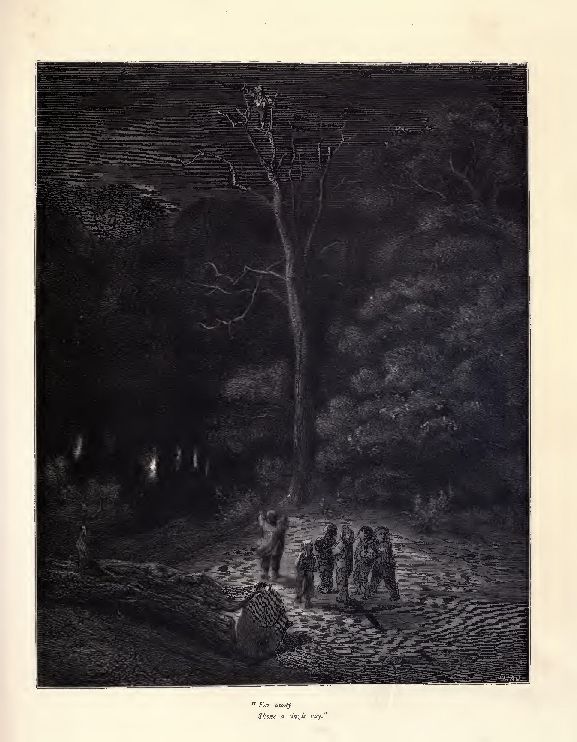
"Far away
Shines a single ray,
But what it may be I can't venture to say;
It looks rather far,
But since here we are
Without any voice
In the matter or choice,
Whatever the distance we ought to rejoice-
For whether the night be a melter
Or pelter-
If it's muggy as beer or it rains helter-skelter-
We mustn't make light of a light that means shelter!"
On went the children, still shoulder to shoulder,
As frightened as bricks, and-than stones vastly colder,
And much more alarmed, for a stone is oft bowlder!
Arm-in-arm,
In alarm,
Expecting some harm,
In a terror no words of their brother's could charm,
They walked t'wards the light
Gleaming out through the night,
And as fearful to turn as if playing at Fright.
Through brake and through mire,
Beginning to tire,
Trudged the sorrowful sons of a sorrowful sire.
On wandered they
In pursuit of a ray
(Though girls more than boys think of dress, so they say);
Till at length at the great
Front-door, postern-gate
(Or whatever 't was called at that very vague date),
Of a castle, or mansion, a building gigantic,
Designed on the model of dwellings romantic-
You queer little crew
Gothic, solid, and strong,
That lasts ever so long-
Not sham Gothic run up on that very bad plan, tick!
'T was terribly high;
It wearied the eye
To follow its turrets up into the sky,
How many feet.
I don't care to repeat,-
I 'm a bad hand at figures, of which to be sparing,
T was as high as the Grosvenor, or Langham, or Charing. *
They none of them knew what course to pursue,
Till Hop o' my Thumb found a horn—which he blew;
Whereon some one the bolts, bars, and fastenings withdrew,
And came out with a light
Very vivid and bright,
On the top of the steps at the head of the flight,
And they saw, to their joy,
Not a man—nor a boy-
But one of a sex for which terms we employ
Of a tenderer sort;
In short, one to court-
"In short"? Not at all—but a tall one, in short!
For she was a giantess, being in figure
Than Chang the tremendous, An-actually bigger.
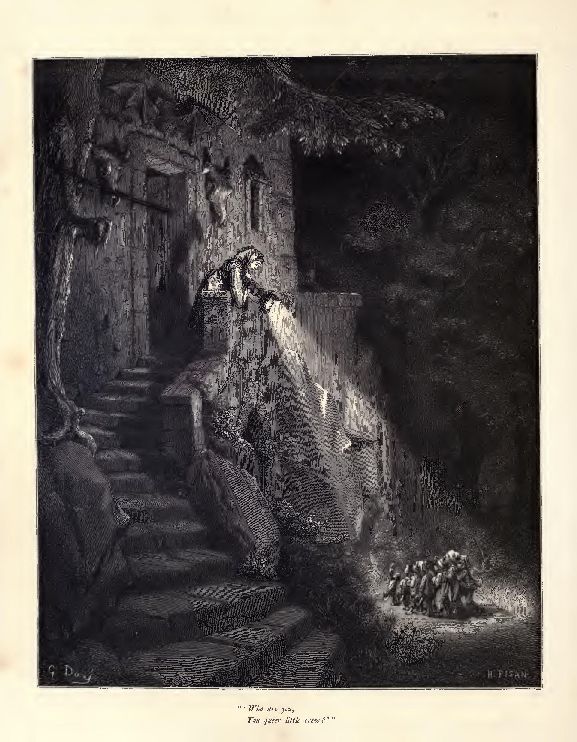
"Who are you, you queer little crew?"
Said Hop o' my Thumb, "Madam, pray how d' ye do?
* The poet who sighed (he's depicted as thin)
The warmest of welcomes to find at an inn
Might equal in panting
The sighs of a Banting
To learn that these inns are prepared, in kind thrift,
To give to those guests who are poorest—a lift!
We people so small
Have come for a call:
We want a night's lodging and supper, that's all!"
"Alas!" said the dame,
"I can't promise that same,
Though your lonely condition to pity lays claim.
But to grant your entreaty were really a sin-
In receiving you here, I should take you all in!"
"Please, madam, do!"
Said the terrified crew,
Who fancied each moment much darker it grew,
And gazing with awe,
Believed that they saw
Wild beasts coming after with ravenous maw
(Not to mention such trifles as jaw, paw, or claw),
And spectres enough all their marrow to thaw;
So closer and closer together they drew,
Repeating the chorus of "Please, madam, do!"
"My poor children!" said she,
"I've a husband, and he
Is an Ogre as savage as savage can be;
His appetite's great, and when hungry he's sweet on boys;
So board, lodging, and clothing
He 'll give you for no-thing, *
Besides education—because you 'll be Eton, boys!"
These words they don't like,
But the terror they strike
Not being so near
As the darkness they fear,
They beg her once more to their prayer to give ear.
* Pray pardon the rhyme, which, it's terribly clear,
Is a rhyme to the eye, not a rhyme to the ear.
If in thus fitting clothing you fancy I fail, or
Am making a botch—say 't was done by a tailor.
"By arm, leg, or head,
He dragged all the urchins from under the bed"
"Please, madam, do!"
Said the terrified crew;
"We're prepared to be eaten, we're in such a stew!
Besides, ma'am, you might
Put us out of his sight;
We only want shelter and food for the night.
Let our prayers, and our tears, and our woes your heart soften;
Some supper provide us,
And hide us—please hide us,-
We 're quite used to it, father has done it so often.''
Moved by their tears, she flung open the door,
And gave them some food; but in five minutes more,
Ere they'd finished their bread
And Gloster, she said,
"Here's the Ogre approaching—get under the bed!
Unless you feel gridiron-like or stewpan-ish,
Or would like to be fried with the onions called Spanish!
They were off in a jiffy,
As promptly as if he
Were Colonel Stodare and had said to them, "Vanish!"
But scarce were they hidden away, I declare,
Than the giant came in with a curious air.
All his wife's kind precautions were very well meant,
But he, like a Jew
Who is going to do
A bill, was not easily sent off the scent.
"Fee, faw, fum!"
Said he, "there are some
Little children about—yes, I nose there are, mum!"
No sooner said,
Than by arm, leg, or head,
He dragged all the urchins from under the bed.
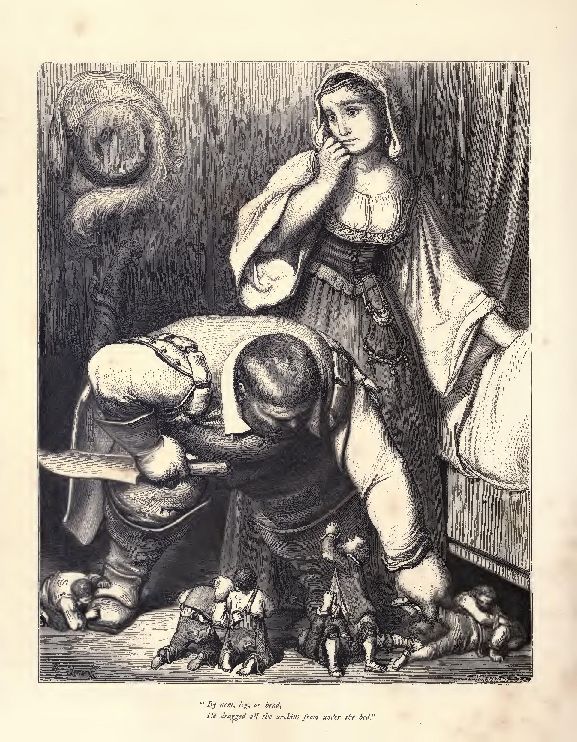
Each began to entreat him
To please not to eat him,
But the Ogre replied he'd be happy to meat him;
So he sharpened his knife
To take every life-
As he would have done had it not been for his wife,
Who showed him the supper she'd got—"Wasn't that enough
If so, she was willing
To feed up for killing
The children, who now he could see were not fat enough.
Said the Ogre, "That's true-
The supper will do.
We 'll fatten the brats for a week—or p'rhaps two.
Meanwhile, since late hours make them tasteless and flabby,
Let them all go to bed—without waking the babby! '
Away they all sped
And hurried to bed,
For fear his opinion should change on that head.
But Hop o' my Thumb, while his brothers were weeping,
Everywhere peeping,
Stealthily creeping,
Found seven young Ogrelings cozily sleeping
In the very next bed on a pillow of down,
And each of them wearing a little gold crown.
Cried Hop o' my Thumb, on perceiving those bright caps,
"We've not been accustomed to sleep without nightcaps!"
So he took the gold circlets away from the others,
And put them instead on himself and his brothers.
By and bye
The Ogre so sly
(Who had made up his mind to a little boy-pie
For his breakfast) comes up in the dead of the night
With his very sharp knife, but without any light,
And so in the dark (as pitched as the ark)
Begins fumbling and feeling about for his mark,-
Comes to the bed,
But feels on Hop's head
A crown, so goes off to his children instead,
And at once—for at slaughter you see he a dab is-
He cuts all the throats of his slumbering babbies.
(For which, since here, Reader, you coroner are, dict-
-Ate, "Sarve him right"—it's the usual verdict.)
Hop o' my Thumb
Heard all, but kept mum;
And as soon as the first streak of daylight was come,
And the dawn "breaking fast" in the heavens he saw
(The night was quite done, if the morning was raw),
Woke his brothers at once; and they all crept downstairs,
Climbed up to a window by aid of some chairs,
Got easily out through a large broken pane,
Jumped down on the grass, and were free once again!
Off went each urchin,
And left quite the lurch in
The Ogre, who still his bed slept like a church in.
And well may they run,
For as sure as a gun
The Ogre will wake and find out what he's done,
And at once setting forth from his castle to catch 'em,
In spite of their start will be sure to outmatch' 'em.
They may run like the wind—but the horrible brute s
Possessed of a pair of charmed Seven League Boots!
Yes! dread and fear!
Already they hear
The giant pursuing them—coming more near:-
They must try to conceal themselves closely, that's clear.
They endeavour to save
Themselves in a cave:
The Ogre approaches, and even the brave
Little Hop o' my Thumb feels a tremor of dread
When the giant, who suffers most frightful fatigues
From striding across at each step seven leagues,
Sits down on the rock that is over their head;
But it's not long before
He's beginning to snore,
And Hop o' my Thumb plucks up courage once more.
"Now while he's asleep
We must quietly creep
From our hiding, and bolt like a parcel of sheep! ''
Out scramble the boys
Without making a noise,
And while this way or that way each rapidly shoots off,
Hop o' my Thumb takes the Seven League Boots off.
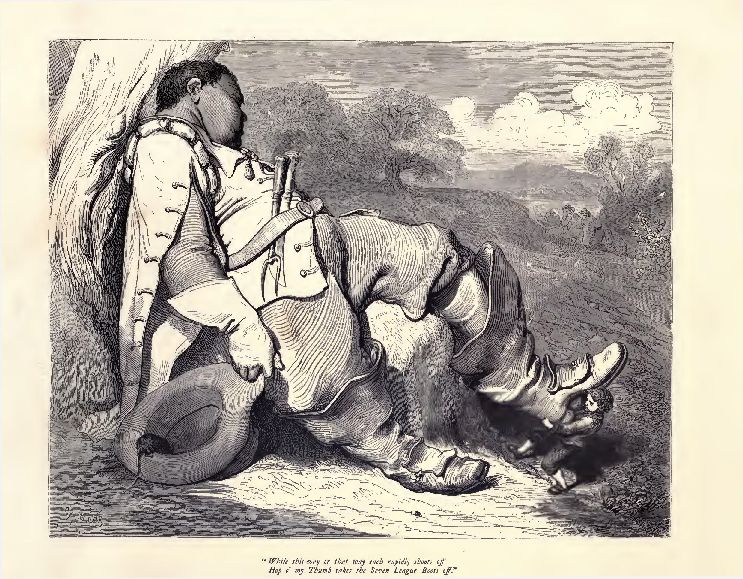
With the boots was our hero at once in his glory.
He returned at full speed to the house of the giant,
And finding the wife to his orders compliant,
Made her hand him more treasure at once from the coffer
Than the whole Bank of England is able to offer,
And took it straightway to his parents, by which
He made, like a 'tickler good joke, the poor rich.
So his and his brothers'
And father's and mother's
Good fortune he made—not to name any others..
And as for the Ogre, what chanced to become of him
I know not—I never asked Hop o' my Thumb of him;
But one can't but suppose
That such giants as those
Which in nursery legends and stories one knows,
By defaming the race must inflict quite a pang
On the large hearts of giants like Anak and Chang,
"While this way or that way each rapidly shoots off
Hop o' my Thumb takes the Seven League Boots off
(Though, their size for their suffering some remedy gives,
Since one learns the more patience the longer one lives).
So we 'll trust that this giant,
So fierce and defiant,
Got punished. Indeed, on one fact I'm reliant-
His gold was all taken by Hop o' my Thumb!
And so being left with a very small sum,
Namely, nothing, 't is likely ere long he began
To fall in arrear—and so sank to a van,-
A poor sort of coop
In which he'd to stoop
(E'en the greatest must bow if their fortunes will droop).
Then at revels and fairs he'd be shown as a sight-
As "A Giant"—see handbills—"unrivalled in height,
Allowed on all sides to be taller than any
That ever existed. Admission, one penny.
N.B. Babies in arms free of charge are admitted."
In which case e'en a monster like that's to be pitied.
l'envoi.
Five Favourite Fairy Fables old,-
The efforts of a muse, which eke
Are efforts to amuse,—are told,
And my farewell 't is time to speak,
Since ended now this book of mine is,
With one more "f" for't—adding
FINIS.